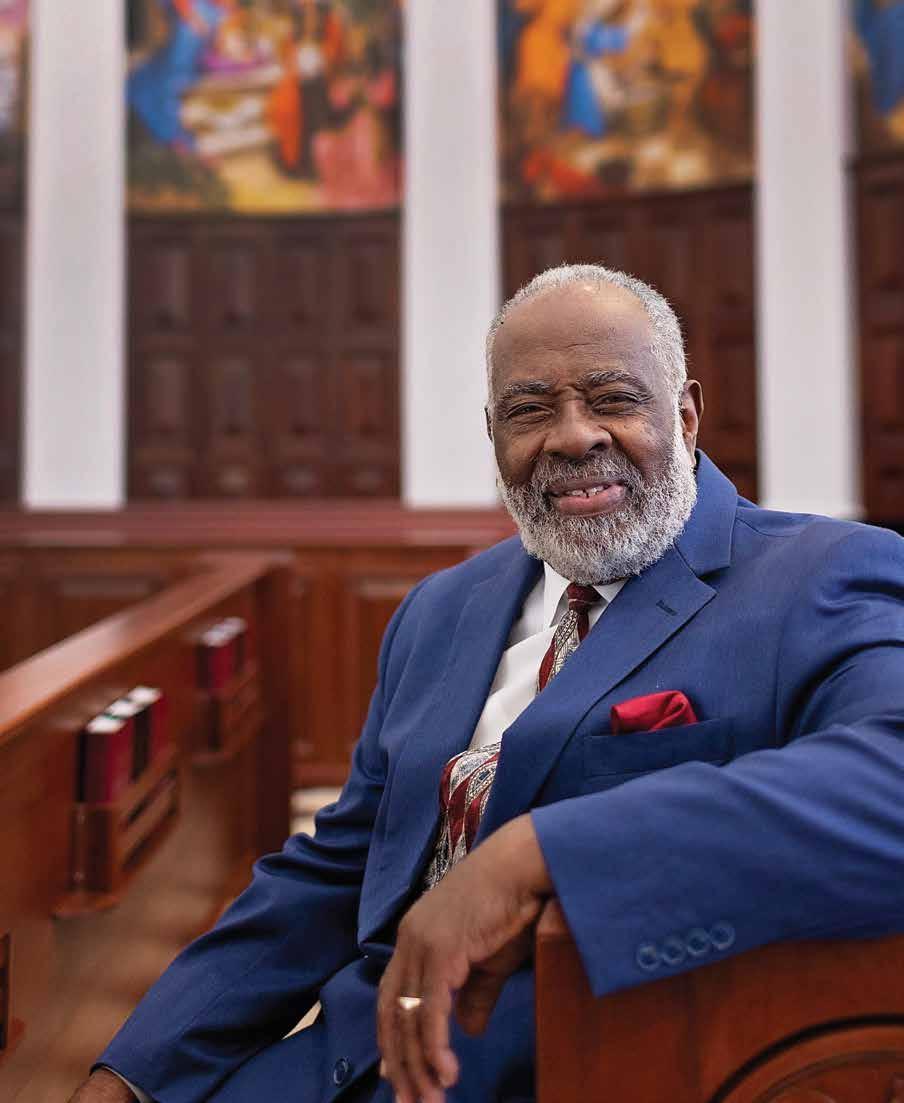
“This is not just a place, it’s a family.”
– Robert Smith Jr.
UNIVERSITY BEESON DIVINITY SCHOOL 2024
SAMFORD


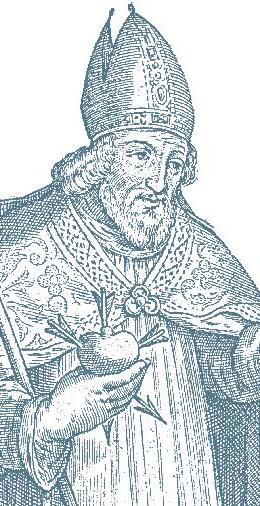
Wisdom

Preaching Life
FEATURES
The Wisdom of Augustine on the Spiritual Formation of Preachers
A Preaching Life
The Delight in Teaching
Interpret, Apply, Preach and Teach
19 Faculty Bookshelf
20 Beeson Announces Addition of Two Old Testament Professors
21 The Best Story to Tell: Recapping the Conger Biblical Preaching Lectures
22 Celebrating Grace: Eastman points students toward Christ in Biblical Studies Lectures
23 Global Center Hosts Timothy Tennent for World Christianity Focus Week
24 A Dedicated Space
26 Beeson Holds Preaching Conference to Honor Robert Smith Jr.
29 A Place of Flourishing and Ministry
30 Preach the Word! Massey Award Winner Charges Peers to Have Courage in Ministry
32 Finding Her Voice: Beeson graduate tells her story of God’s faithfulness
34 New Scholarships Support Students’ Call to Ministry
35 Cecelia Ann Walker Named Beeson’s Alumna of the Year
36 Alumni Updates
2
4
6
10
16
18
NEWS
From the Dean
The Rock and Reed Challenge
4 6 10
CONTENTS
The Rock and Reed Challenge by Doug Webster The
of Augustine on the Spiritual Formation of Preachers By Michael Pasquarello III
A
By Neal Embry and Evan Musgraves
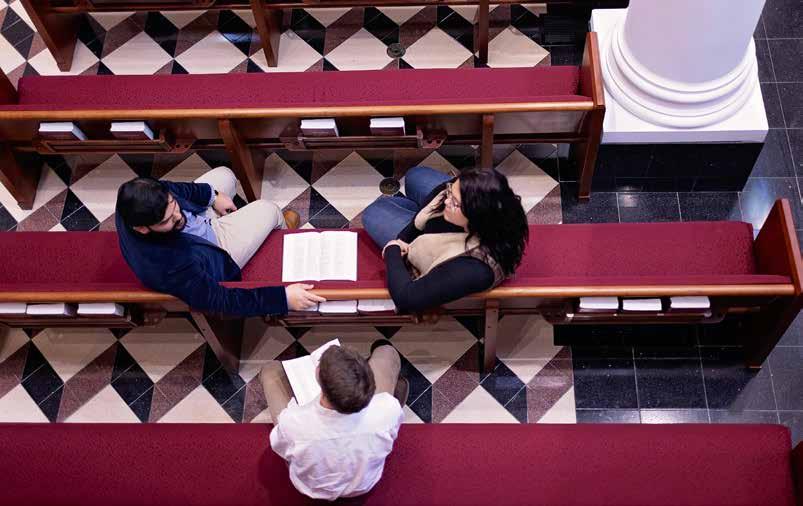

Douglas
Editor
Designer
Creative
Sarah
Copyeditor
Contributors
Doug
Michael
Dean
A. Sweeney
Embry
Neal
Camp
Scott
Services
Waller
Wright
Deidre Lackey
Miles
Photography
Brooks
Lauren
Webster
Pasquarello III
Musgraves
Rice Beeson Divinity School Samford University 800 Lakeshore Drive, Birmingham, AL 35229 205-726-2991 • samford.edu/beeson-divinity ©2024 Beeson Divinity School, Samford University Visit samford.edu/beeson-divinity/events for latest events schedule. Beeson Divinity School is accredited by the Association of Theological Schools in the United States and Canada. Samford University is an Equal Opportunity Institution that complies with applicable laws prohibiting discrimination in its educational and employment policies and does not unlawfully discriminate on the basis of race, color, sex, age, disability, veteran status, genetic information, or national or ethnic origin. Fall Preview Day Beeson Basics: Abbreviated Preview Day Reformation Heritage Lectures OPENING CHAPEL SERVICE AT BEESON DIVINITY SCHOOL CALENDARS MARK YOUR Aug. 27 Oct. 18 Sept. 10 Oct. 29-31 To see the full fall schedule, go to samford.edu/beeson-divinity/worship
Evan
Dakota
From the Dean
Douglas A. Sweeney
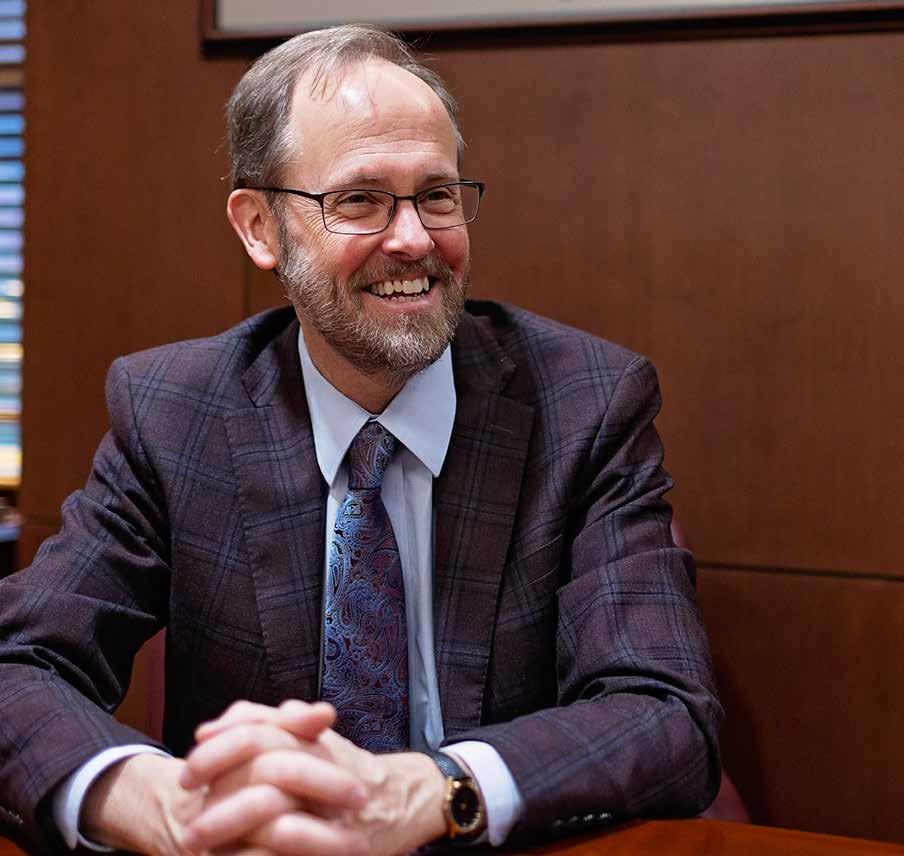
2 • Beeson Magazine • 2024

One of the first things I did when I moved to Birmingham back in 2019 was to quantify the age of our faculty. I could tell right away the next 10 years would be a time of rebuilding. I committed myself before God from day one to the crucial work of faculty development.
There is nothing more important in the work of a dean than the hiring of faculty—especially these days, when our churches are declining, our seminaries are shrinking and pastors near and far have nearly run out of gas. We at Beeson rejoice in our God-given mission of shaping men and women for the service of the church. To carry out our mission, we require great professors who can form future ministers to be faithful preachers, learned disciplers and loving counselors. Hence our stress in this issue of Beeson magazine on faculty transitions and the ongoing art and craft of preaching with excellence.
For the first time since pollsters have maintained good records, more Americans are staying away from church on Sunday mornings than are worshiping together in local congregations. Some 40 million American adults have stopped attending in the past quarter century. The next generation of Christian leaders will be the first in modern U.S. history to serve in contexts where most in their communities seldom go to church.1
Competition for the hearts and minds of everyday Christians has never been greater. Our world is overstimulated. Young people, especially, are inundated with podcasts, social media influencers and academic leaders who are far more influential in shaping the way they think than their local pastors are. Bad spiritual advice is now permeating their lives. And in an effort to reclaim an authoritative voice, many churches have
oversimplified their messaging. They have stripped the Christian faith of its age-old, life-changing, edifying pedagogy, leaving its adherents with an immature faith unable to satisfy their own deepest longings. “My people are destroyed for lack of knowledge,” wrote Hosea (Hos. 4:6), a statement that applies to many congregations today. The gates of hell will not prevail against the church, Jesus promised (Matt. 16:17-19), but many local churches are in crisis.
We at Beeson resolve to form the kind of Christian leaders that our churches need most: godly, humble, loving servants of the Lord and His people who are ready to make disciples and feed people again. Our students spend years immersed in God’s holy Word, internalizing the best of the history of Christian thought and practicing the ministries of preaching, teaching, counseling and presence in the lives of God’s people. They are guided by faculty who know and love the Lord. Indeed, one of our distinctives in preparing students for ministry is our unwavering emphasis on “life together” learning.
We seek to restore integrity to the pastoral office—and to do so with you, our alumni and friends. We are working toward a day when far more churches are rich fountains of biblical learning, thoughtful Christian living and profound love for God and neighbor. Only 36 years old, we are steadily becoming one of the most helpful seminaries anywhere.
God is forming the kind of ministers the world sorely needs in Divinity Hall at Samford. Won’t you join Him in this work? We are praying He’ll stir your hearts to pray for and give to our students for His glory and the good of His church. Soli Deo gloria. D
1 Jim Davis and Michael Graham, with Ryan P. Burge, The Great De-churching: Who’s Leaving, Why Are They Going, and What Will It Take to Bring Them Back? (Grand Rapids: Zondervan, 2023).
samford.edu/beeson-divinity • 3
Dean
The Rock and Reed
The prophets and the apostles used a variety of metaphors to describe the impact of God’s Word. Jeremiah likened preaching God’s Word to fire burning up straw or a hammer breaking a rock. Isaiah’s servant of the Lord represents the other end of the preaching spectrum: “He will not cry aloud, or lift up his voice, or make it heard in the street; a bruised reed he will not break, and a faintly burning wick he will not quench.” The Word of God is a double-edged sword, confronting and comforting, convicting and consoling, judging and saving.
These two metaphors, the rock and reed, encompass the power and the wisdom of God to cover the full range of human need. The power of God’s Word to achieve its purposes is never in doubt, but our ability to swing the hammer that breaks hard hearts and our ability to preach so as not to break a bruised reed remains the preacher’s challenge. Left to ourselves it is impossible, but in the Spirit, it is not only possible but a personal and practical necessity.
Anyone who follows the Lord Jesus Christ and seeks to communicate God’s Word faces the rock and reed challenge. For fathers and mothers, it is a daily concern in parenting. Husbands and wives, brothers and sisters, friends and co-workers, need to discern when to deliver a prophetic word and when to appeal with a comforting word. Pastors ought to lead the way in showing the household of faith how to use God’s Word to strengthen conviction and to show compassion.
If it is our deep desire to present “everyone mature in Christ” (Colossians 1:28) we will face the rock and reed challenge. This involves helping believers use God’s Word to “discern what is best” so that we all
1 Robert Smith Jr. Doctrine that Dances: Bringing Doctrinal Preaching and Teaching to Life (Nashville, TN: B&H Publishing, 2008), 44
“Is not my word like fire, declares the Lord, and like a hammer that breaks the rock in pieces?”
Jeremiah 23:29

may be “filled with the fruit of righteousness” (Philippians 1:9-11). The goal for all Christ’s followers is to “try to discern what is pleasing to the Lord” and “to walk in a manner worthy of the calling to which you have been called, with all humility and gentleness, with patience, bearing with one another in love, eager to maintain the unity of the Spirit in the bond of peace” (Ephesians 5:10; 4:1-3).
Good preaching is grounded in God’s Word and helps believers think for themselves, so that they are no longer “conformed to this world” but are “transformed by the renewal of [their] mind” (Romans 12:2). If pastors preach the whole counsel of God, they will find the hammer that smashes rocks and the grace that protects the bruised reed.
Jesus illustrates rock and reed discernment in his dialogue with Nicodemus and the Samaritan woman. At the outset of Jesus’ public ministry, He preached the Gospel to two quite different people. Nicodemus was named—his name meant “victor,” and he was a ruler among the Jews, a member of the Sanhedrin, an orthodox Pharisee, living in Jerusalem. He inquired of Jesus at night, perhaps out of privacy concerns. He may have come out of personal interest, or he may have come out of a sense of duty. By contrast, the unnamed woman was an ordinary person living in a rural Samaritan village. She was either a victim of great loss or great lust. She may have been marginalized because of her marital status. She belonged to the heretical sect of the Samaritans. Neither the man nor the woman would have had anything to do with each other for any number of reasons, but Jesus related to both in the most profound way.
4 • Beeson Magazine • 2024
Photo by Maxwell Ingham on Unsplash
Challenge
These two individuals could not have been more contrasting: Nicodemus was a selfconfident, powerful Pharisee and she was an insecure Samaritan woman. She may have been an abused woman, a grieving widow, who was passed down from one brother to another or perhaps was a promiscuous woman. In any case, she came to the well at noon to avoid others and to draw water. She had no desire to relate to anyone, especially to a Jewish man sitting by the well.
Like a blacksmith hammering on an anvil, Jesus shattered Nicodemus’s self-confident religious worldview with his unexpected pronouncement, “You must be born again.” But to the Samaritan woman, a bruised reed if there ever was one, Jesus humbly requested a drink of water before offering the living water of eternal life.
The apostle John narrates these two strikingly different encounters side by side to draw out Jesus’ distinctive rock and reed approach to the Gospel. Throughout his ministry, Jesus met the preaching challenge. He shattered the rock of unbelief and protected the bruised reed. The Word preached has the power to shatter the hard-heartedness of the self-righteous and the power to comfort the insecure and brokenhearted. It confronts the oppressor and the oppressed alike with the Gospel of repentance, redemption and reconciliation.
The hard edge of prophetic conviction remains just as relevant today as it was in Jeremiah’s day.
The truth of the Gospel shatters the ideological captivity of our late modern age. It breaks the chains that bind hearts and minds. If we preach Acts 4:12, “there is salvation in no one else, for there is no other
By Doug Webster
“A bruised reed he will not break, and a faintly burning wick he will not quench.”
Isaiah 42:3

name under heaven given among men by which we must be saved,” it is like a hammer blow against the rock of unbelief. Yet the beauty of Isaiah’s description of the one who does not break the bruised reed remains equally true. Like Paul, we are not ashamed of the Gospel because “it is the power of God for salvation to everyone who believes” (Romans 1:16). Good preaching involves both powerful exhortation and compassionate entreating.
My dear friend and colleague Robert Smith Jr. is devoted to the biblical principle that preachers preach so the people of God can preach.1 Physical presence and personal engagement is critical to learning and genuine comprehension. Significant and edifying communication depends on being in communion with God and in community with one another. This is why in-person, in-community learning is so important at Beeson. I can’t imagine trying to raise kids online and I’m not so sure it is all that different for growing strong disciples. Preaching and teaching God’s Word is vital to this soul-shaping work, but it is best done in such a way as to relate to people and invite personal interaction.
Preaching is a dynamic, visceral, relational activity that cannot be contained in the study. Even my body tells me I’m going to preach hours ahead of time. Preaching is both a great burden and a driving passion, and even after many years, preaching doesn’t become any easier, but it becomes more significant. D

This article comes from the preface of Doug Webster’s new book, More than a Sermon: the Purpose and Practice of Christian Preaching (Lexham Press, 2024).
samford.edu/beeson-divinity • 5
Photo by Sergi Dolcet Escrig on Unsplash
The Wisdom of Augustine Spiritual Formation of Preachers
By Michael Pasquarello III
Writing in Confessions, St. Augustine described an intensive seeking for wisdom prior to his conversion to Christianity. This passionate love of philosophy in pursuit of eternal truth was a commitment to a whole new way of life, an intellectual, moral and spiritual awakening and inner healing facilitated by the spoken or written words of ancient sages. Following his baptism and incorporation into the body of Christ, Augustine wrote of the intellectual vanity fostered by his love for philosophy. He confessed his prideful illusion that human reason is capable of ascending unaided to attain divine wisdom and happiness.1
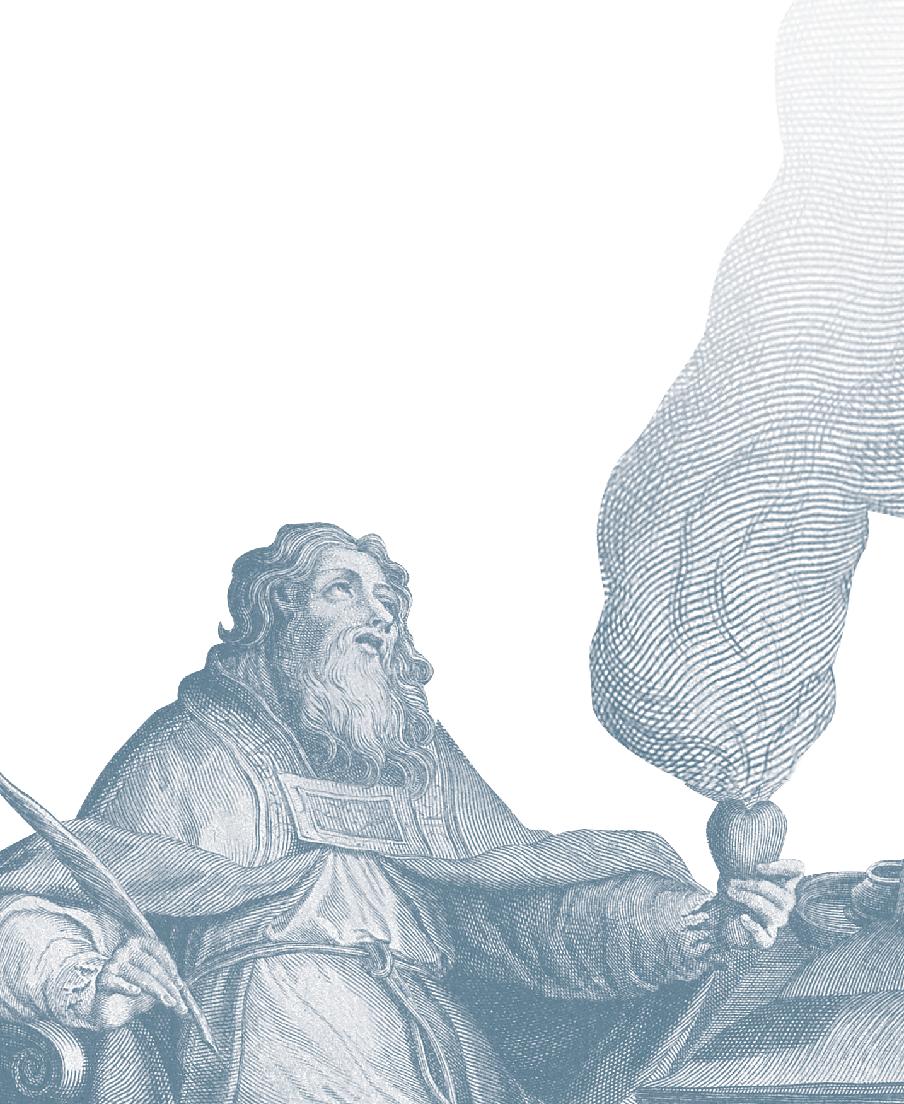
6 • Beeson Magazine • 2024
on the Preachers

In his work as a Christian bishop and preacher, Augustine retained the pedagogical insights he learned as a student and teacher of philosophy. Assimilating these to the doctrine of the incarnation, revealed in the church’s “folly of preaching” and cruciform way of life, he proclaimed the true “philosophy” of Christ, God’s wisdom, the spiritual principle of creation and means of its redemption.
“And so, it was in the Wisdom of God that the world was unable to come to know God through wisdom. So why did she come, when she was already here, if not because it was God’s pleasure through the folly of preaching to save those who believe? … That is how the Wisdom of God treats the ills of humanity, presenting herself for our healing, herself the physician, herself the psychic. So, because man had fallen through pride, she applied humility to his cure. We were deceived by the wisdom of the serpent; we are set free by the folly of God. On the one hand, while her true name was Wisdom, she was folly to those who took no notice of God; on the other hand, while this is called folly, it is in fact Wisdom to those who overcome the devil (DDC,I.12-14).”
Augustine’s affirmation links the person and work of Christ to humanity and is situated within the Trinitarian faith confessed by the church. The whole life and ministry of Jesus is the work of God in which the Son of God, anointed by the Spirit, takes to Himself our fallen world, our sinful, human flesh and lives in it a life of faithful, loving praise on our behalf, doing the will of the Father, walking according to God’s wisdom and following God’s way. In this vocation, Jesus learned for us the wisdom we have lost through the sin of foolishness, overcoming our idolatrous and destructive ways; restoring and bringing to completion our life and destiny as creatures made for peace in the image of God. Fully God, He descended into ignorance and humiliation; fully human, He advanced and in wisdom and character to demonstrate His full participation in our creaturely life for us and for our salvation as communion with the Triune God.2
By following this classic creedal pattern, Augustine depicted the Christian way of life as conformity to the church’s faith in the Father, Son and Holy Spirit, as loving surrender to Christ, the mystery of divine wisdom by which the Spirit binds together the communion of saints (DDC, I.12 – 14, 13). He therefore sought to persuade pastors to yield themselves to a particular manner of believing, loving and speaking which constitutes a particular habitus, habits of the mind and heart, a form of theological judgment and spiritual discernment necessary for rightly hearing and speaking the Word of God. This “knowing how” comprises the enactment of truthful practice and guides pastors in the conduct of their homiletical responsibilities. The union of knowledge and love—passionate knowledge—is required to grasp divine wisdom, the “grammar of God” which informs, shapes and directs pastoral speech for the healing of humanity through union with Christ by the Spirit’s love.3
Augustine, moreover, was no stranger to the wisdom and healing power of the Spirit in the ministry and fellowship of the church. Through an extended process of repentance, confession and forgiveness, his mind was changed to perceive the restlessness which seeks certitude and control through attachment to created things instead of their Creator. He also saw how this restlessness is satisfied only when reoriented and drawn into loving communion with God in loving friendship with others. Only the gift of faith enables acknowledgment of one’s sinfulness, limits and death within the larger scriptural story of God’s truth, goodness and love. Understanding thus increases in direct proportion to the degree we acknowledge our dependence upon God through our belonging to God’s people. Human lives, therefore, become truthful when yielded up as acts of praise and thanksgiving to the Father in union with Christ through the illumination of the Spirit.4 As Augustine prayed in the beginning of Confessions: “You have made us for yourself, and our heart is restless until it rests in you” (Confessions, I.I). Christopher Thompson comments:
1 William Mallard, Language and Love: Introducing Augustine’s Religious Thought Through the Confessions Story (University Park: Penn State Press, 1994); see also Helen Charry, By The Renewing of Your Minds: The Pastoral Function of Christian Doctrine (New York and Oxford: Oxford University Press, 1997) 120-152.
2 Colin E. Gunton, Theology Through Preaching (Edinburgh and New York: T&T Clark, 2001) 79-84.
3 Charry, By the Renewing of Your Minds, 3-34.
4 See the excellent discussion of the Confessions in Kim Paffenroth and Robert P. Kennedy ed., A Reader’s Companion to Augustine’s Confessions (Louisville: Westminster/John Knox, 2003).
samford.edu/beeson-divinity • 7
“The normative guiding principle guiding the Confessions is the doctrine of the Church concerning God as the Triune Creator of all that exists and Redeemer of all who seek reconciliation … the overriding motif of any narrative of Christian experience is the claim that ‘God has made us for himself’ … This is the drama of the revelatory narratives: that I find in them, not confirmation of myself, but very constitution of myself. I do not place the actions of God within the horizon of my story; rather, I place my story within the action of God. ” 5

The pastoral ministry of preaching is a human witness to the gift of salvation lovingly and justly bestowed. Preachers point to the humble presence of Christ who, in the Spirit, fills the church by communicating Himself for the redemption of creation. Spiritual formation, then, involves one in becoming a certain kind of person through the cultivation of spiritual wisdom and moral virtue, those “graced” capacities which unite knowing, loving and speaking of God. On the one hand, this involves unlearning sinful habits and judgments that turn one’s vision away from God and a life ordered to goodness; on the other hand, this involves acquiring new habits of thinking, loving and speaking formed by participation in the scriptural narrative of God’s providential drama of salvation (DDC, I.14.13-20, 21).
According to Augustine, such spiritual formation occurs within and bears witness to God’s saving work of restoring and renewing creation to its true end: godly fear which is the beginning of wisdom; piety, a willingness to learn; knowledge of Scripture, one’s self and human
sinfulness; courage and constancy in adversity gained through prayer; divine counsel and mercy; the purging of restlessness and love toward one’s enemies; purity of sight or vision through death to the world; and lastly, wisdom enjoyed as communion with God (DDC, II. 7.9-14). Moreover, immersing ourselves in the church’s doctrine, discipleship and devotion nourishes a proficiency in Scripture, a capacity for speaking simply and wisely with a “derived” authority that bears witness to the crucified and risen Lord among His people. Purity of heart and the gift of understanding sustain constancy and patience, a habitual way of “knowing how” to speak in a manner that builds up the witness of the church to the presence of Christ.6
I have highlighted Augustine’s discussion of learned piety, loving God fully with both heart and mind to demonstrate the kind of wisdom required to orient the words we speak in service of the true purpose of our life in God: the love of God, as the gift of the Spirit (the source of life) who leads us to faith in Christ crucified and risen as our way to God (the means of life) in whom alone we attain complete happiness and holiness for the praise and glory of God (the final end of life).7 D

Michael Pasquarello III was the Methodist chair of divinity, director of the Doctor of Ministry program and director of the Robert Smith Jr. Preaching Institute. He retired at the end of the 2023-24 academic year.
5 Christopher Thompson, Christian Doctrine, Christian Identity: Augustine and the Narratives of Character (Lanham, New York, Oxford: University Press of America, 1999) 99, cf. 78-91.
6 Andrew Louth, Discerning the Mystery: An Essay on the Nature of Theology (Oxford: Clarendon Press, 1983) 79-85.
7 Carol Harrison, Augustine: Christian Truth and Fractured Humanity (Oxford: Oxford University Press, 2000) 37-39; Mallard, Language and Love, 219-229.
8 • Beeson Magazine • 2024

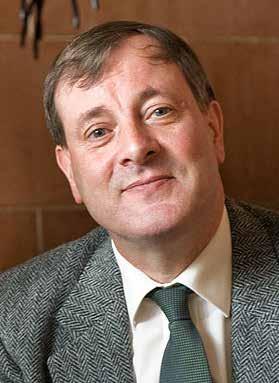
Beeson Preaching Conference 2025 Save the Date July 15-17, 2025 Hosted by the Robert Smith Jr. Preaching Institute Featured Speaker Alister McGrath samford.edu/beeson-divinity • 9
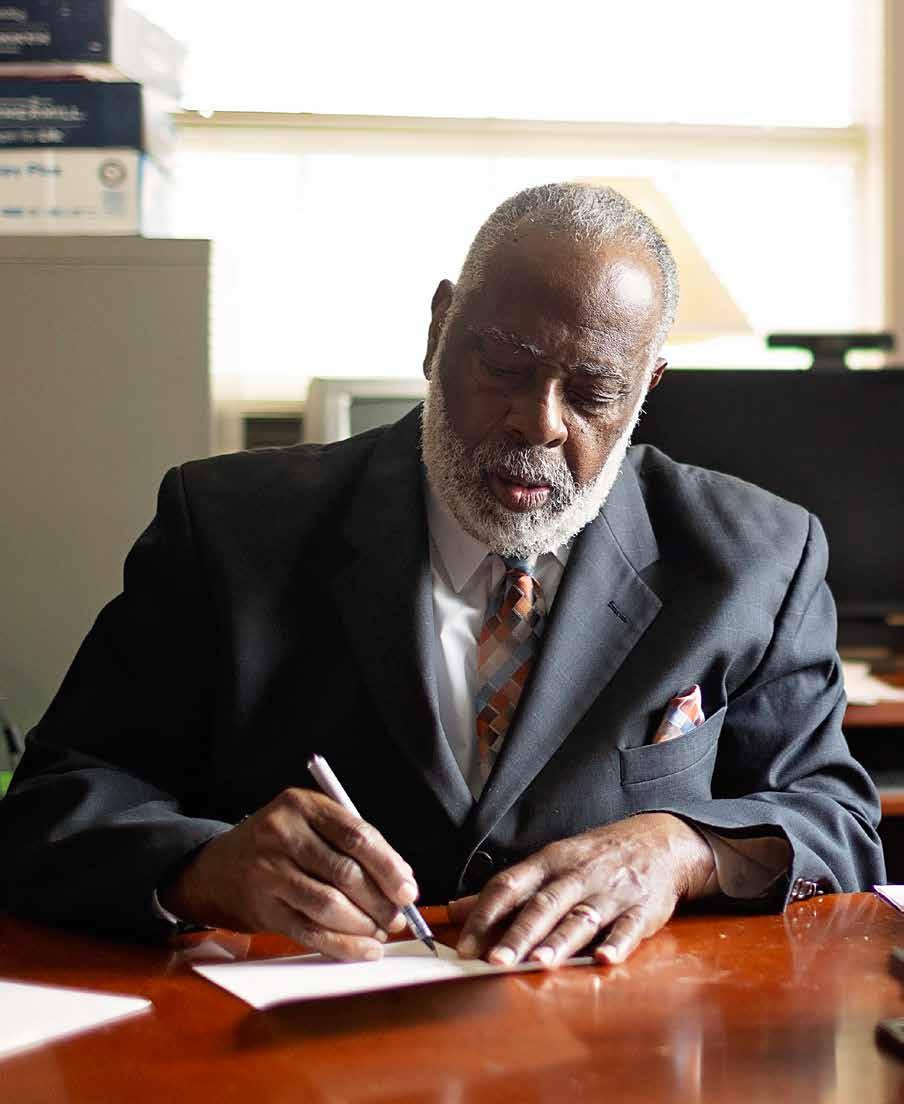
10 • Beeson Magazine • 2024
By Neal Embry and Evan Musgraves

When Timothy George was preparing to hire a professor of preaching for Beeson Divinity School in 1997, he asked renowned theologians James Earl Massey and David Dockery for a recommendation. “If you were starting a divinity school and preaching was most significant, and you needed help with teaching, who would you hire?” George asked them.
Massey was quick with his answer. “Dr. George, there is a person who would do a superb job, if you can win him: Dr. Robert Smith Jr.,” he said.
samford.edu/beeson-divinity • 11
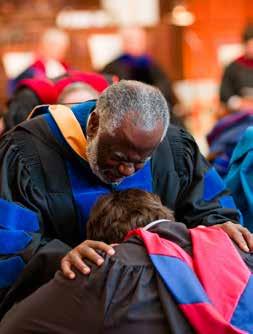
For George, the school’s founding dean, the search process was “over at that point.” He called Smith in January 1997 and asked him to join the faculty at Beeson Divinity School.
While George believed he’d found his man, Smith wasn’t so sure. Smith was just months away from earning tenure at The Southern Baptist Theological Seminary, where he served as the Carl E. Bates Chair of Preaching and had meaningful relationships.
“I didn’t want to go to Beeson, not because of Beeson, but because I didn’t know anything about Beeson,” Smith said. “I didn’t want to be 500 miles away from my home, and I didn’t want to leave my students at Southern Seminary.”
But his wife, Wanda, told him she thought the Lord may be up to something. She insisted he give Beeson Divinity School a meeting.
Listening to his wife, Smith met with the search committee, but he reiterated to them he had no plans to join the faculty. He had only come to “see if a bush was burning and if a voice was going to speak from the bush,” he said.
As it so happened, the bush did burn and the voice of God did speak that day, Smith said. The Lord was indeed up to something. Now, 27 years later, as Smith retires from full-time teaching at the school he once wasn't sure about joining, Beeson has
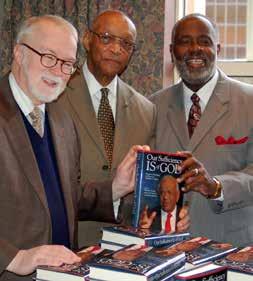
become a family and a job he wasn't sure he wanted has become a joy, one that has left its mark on a countless number of pastors, preachers and ministers.
If He Becomes a Preacher, It Will Be Because God Told Him.
Robert Smith was born on May 26, 1949, to Robert and Ozella Smith. When he was 4 years old, his family moved to Cincinnati, Ohio, where he still maintains a home.
Smith’s memories of growing up in Cincinnati are mostly good—playing baseball and collecting soda bottles to cash in for treats. Church also played a key role in his upbringing. “Church was a great memory. I was saved at 7 years old, but even before then, I was taken to church and enjoyed it. I enjoyed being with the children there, going to Sunday School, having to know the golden memory verse and being given a quarter if you knew it by the pastor,” Smith said.
Smith’s conversion experience was, as he put it, quiet, unplanned and uninfluenced in terms of what other young people may have done. “I sat under people who believed the Bible and people who were serious about Christianity,” Smith said.
Leading up to his salvation, Smith recalled hearing the Gospel “not anew,” but in a different, compelling way. “I was still
L to R: Smith prays over a graduate during a time of consecration. Timothy George, James Earl Massey and Robert Smith Jr. stand with the book they coauthored, Our Sufficiency is of God: Essays on Preaching in Honor of Gardner C. Taylor.
seeing through a glass darkly, but I trusted Christ by simple faith and believed and was saved,” Smith said.
After more than 60 years of following Christ, Smith said he’s still going deeper into what happened when God justified him. “I can give you the Scriptures, but the experience is too wonderful,” he said.
While an innumerable number of pastors and preachers have been shaped by Smith’s preaching and teaching, he was first shaped by the preaching and influence of his childhood pastor, E.L. Alexander. “He discipled me,” Smith said. “My mother gave me to him like Hannah gave Samuel to Eli.”
As a junior deacon, Smith spent time around the senior deacons of his church, including his father. He was given the opportunity to read Scripture, sing and pray. He also learned early on the significance of theology and Baptist confessions, was required to know the 24 Articles of Faith in the Missionary Baptist tradition and more.
From an early age, he knew he wanted to teach the Bible. At age 14, he was teaching the deacons. He’d often invite neighbors into his home to study the Bible with him. His zeal for God’s Word and God’s church led some to speculate God was calling him to preach. His mother would have none of that. “People began to say, ‘You’re going to be a preacher; I see the mark on you,’” Smith said. “My mother would be-
12 • Beeson Magazine • 2024
come angry. Don’t tell him he’s going to be a preacher. If he becomes a preacher, it will be because God told him. Whatever God wants him to do is what he’s going to do.”
Turning Ink Into Blood
On June 10, 1966, on his father’s birthday, during a worship experience, Smith knew the Lord was calling him to preach. A few weeks later, a 17-year-old Smith preached his first sermon, “Lord, I Shall Preach the Gospel,” taken from Luke 4:1822: “The Spirit of the Lord God is upon me because He has anointed me to preach the Gospel to the poor.”
Nearly 60 years later, that first sermon still shapes him, serving as a guidepost on how to approach the text. “I have taken that text, explored the text, lived at the address of the text, and then I have moved out into the zip code of supporting texts and Scripture to corroborate, examine, to buttress, to confirm, so that in essence the sermon is theocentric,” Smith said. “The
sermon is pneumacentric, in terms of the Spirit. The sermon is Christocentric. It ends on an eschatological note. Well, that’s what I believe now. But it’s like a ripple. Now it’s widening and widening. I was doing then what I do now, but I did it unconsciously then.”
For 28 years, Smith served at New Mission Baptist Church. He first served as an associate pastor for eight years, and later for 20 years as the church’s senior pastor.
In March 1967, almost a year after the Lord called him to preach, Alexander invited Smith to preach at Shiloh Missionary Baptist in Newark, Ohio. The morning of the message, Alexander turned to him at the breakfast table and asked, “Bobby, you got your sermon?”
Smith showed him about 50 pages of notes he had compiled on John 8:12.
“Bobby, you need all this? You have 30 minutes to preach. You can’t remember any of this without 50 pages? How do you expect people to remember what you can’t
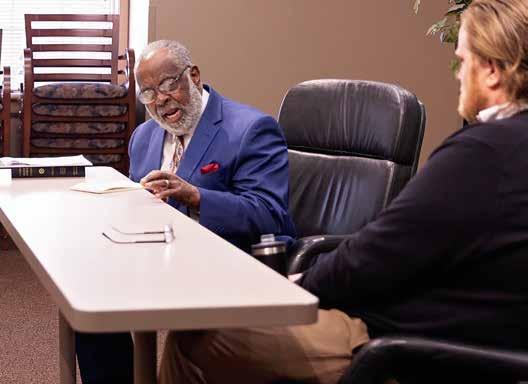
remember?” Alexander asked him.
Smith explained Alexander wasn’t against using manuscripts or outlines or notes. What Smith’s mentor wanted him to grasp, and what Smith spent 27 years imparting to Beeson students, is that the sermon must be in them before they preach it to others.
“It's the best thing that ever happened to me in my ministry because he taught me that preparation is not just ink on paper. Preparation is turning ink into blood so that it gets in you,” Smith said. “You can preach it with the manuscript, with notes, with an outline. That's not the point. Is it in you? If it's not in you then I don't care how many pieces of paper that you have. You're not ready to preach. Get it in you—not memorized but internalized.”
Take Them to the Throne Room
The first lesson Smith taught his students was they could not preach. “God has called you to do something you can’t do,” he said. “The only way to do something you can’t do is for God to do it through you. Preaching involves the power of God working through you. No matter how smart you are, how loquacious … you can’t preach. You can make speeches and utterances. But preaching—not just information, but transformation—you can’t do that unless God does it through you.”
Preaching, Smith said, is the ushering of people by the Word of God into the presence of Christ the Son of God through the power of the Spirit of God for the purpose of transformation. It is an explicitly Trinitarian task, and one that, once the hearer has entered into God’s presence, is complete from the preacher’s point of view, he said. “In the throne room, transformation
Smith provides feedback to Beeson student William Jordan during one of his preaching classes.
samford.edu/beeson-divinity • 13
takes place,” Smith said. “I’m not involved in that. I don’t get involved in the Triune God’s throne room. I lead them to it. And then the door is shut.”
As transformation happens, Smith said his role, and the role he wants his students to understand they will have, is to disciple and mature. “If I do my job and exegete the Scripture as I should, then my job is over,” Smith said. “I have nothing to do with transformation. God does. It’s my job to move that child from infancy toward maturity. I don’t want them to remain in a state of infancy. I want them to be ready for the army.”
How Do You Sing at Night?
Smith is no stranger to suffering. In 1984, he preached the funeral for his first wife, Gayle, who died unexpectedly. One of his sons, Tony, was murdered in 2010, the victim of an attempted robbery. And last spring, his son Robert III died after a 15year battle with cancer.
When Gayle died, Smith said God asked him if he really believed what he preached. “I’ve been telling people you’ve got to go
through the valley of the shadow of death. You can’t go around it,” he said. “Your people will be watching you. Do you have the faith you tell them they should have, or are you going to wilt? Are you going to deny the goodness of God when something in life breaks your heart?”
“People want to know whether or not faith works, not just when you’re mouthing faith from the pulpit but when you’re living faith from the depths of your pain,” he said.
Walking through the valley forced Smith to wrestle with whether he can and will praise God in the bad times as well as the good times, whether he can, as Charles Spurgeon once said, “sing when it’s time to sigh, to feast when it’s time to fast.”
“What do you do when life breaks down?” Smith said. “Can you experience God breaking through? That’s been the challenge. Does faith and life match, or is faith just something that has to be categorical? Can it be all inclusive of life?”
And while Smith has “been to the bottom,” he has found “the bottom is solid.”
In navigating suffering, Smith recalled a sermon Spurgeon preached on Job 35,

where he described the call of God to trust Him and to worship Him in suffering with the work of the nightingale.
“The nightingale is distinctive in that other birds that sing put on their concerts during the day, but the nightingale sings in the night,” Smith said. “That’s the whole idea. It’s easier to sing during the day, but how do you sing at night?”
Beeson’s Pastor
At 8 and 9:30 a.m. on Tuesdays and Thursdays for the past 27 years, Smith opened each of his classes by asking students, “Is there anything we need to take to our Father as a family to pray about?”
After prayer, he would teach or sit and listen as students preached, evaluating their work to help them sharpen their skills as a minister of God’s Word. While his preaching and preaching classes are legendary, so too are the close relationships he’s formed with students, not just as a professor, but as a pastoral figure and friend, as someone who aspired to “write in the lives of his students” and is often referred to as “Beeson’s pastor.”
“I’m a pastoral professor,” Smith said. “That’s just me. That’s the way God has given to me. If I couldn’t do it that way, I couldn’t do it at all.”
His relationships with students have been such some have named their children after him. He’s eaten in their homes, slept in their chairs and held their babies. He has attended their funerals and officiated their weddings. While he said he doesn’t deserve that, he’s grateful for it. “These students have become my family,” Smith said. “Relationships are central to everything that’s happened to me.”
Smith talks with Morgan Champion '24 about her work as she was preparing to graduate.
14 • Beeson Magazine • 2024
In addition to leaving a lasting impression on students, Smith has also left a mark on his fellow faculty members.
“I have come to know and value Robert Smith as a brother in Christ and good friend,” said professor Mike Pasquarello, who also retired this year. “I will continue to cherish our friendship in retirement, as we will be living not far from each other.”
Douglas A. Sweeney, dean of Beeson Divinity School, called Smith one of the most influential preachers and teachers of preaching in the world. “And yet no one invests more time, love and prayer in our students than he does. Hundreds around the world count him as a spiritual father. We will miss him in the classroom but are pleased to say that he plans to visit and minister at Beeson frequently in years to come,” he said.
For George, the man who brought Smith to Beeson, there are certain “Beeson facts” that are beyond question in his mind.
“God put it into the heart of Ralph Waldo Beeson to endow a new theological school on our campus in 1988. God brought together a wonderful nucleus of students, staff and faculty to begin this work,” George said. “God gave Robert Smith a holy hunch that this new community was where he should invest his considerable talents and gifts for Christ.
“As they say, the rest is history.” George continued, “History lived in part, and history still in the making. Thank you, Lord, for Robert Smith, Beeson’s jewel of love and learning. Bless him and keep him ever in your grace and providential care.”
Scan the QR code to watch the videos honoring Robert Smith Jr.
This is Not Just a Place. It's a Family. As he prepared to step away, Smith said he’s “sailing uncharted waters and traveling under sealed orders.”
While he will keep an office at Beeson Divinity School and will remain in relationship with the Beeson community, he’s not sure what comes next. “I don’t know, but I know who knows, and that’s enough for me,” Smith said.
Smith said his time at Beeson was filled with more than just teaching classes, grading papers and evaluating sermons. “I’ve been on the playground of the Holy Spirit,” he said. “And I’ve been having a sense of holy hilarity, holy fun. It hasn’t been a duty; it’s been a delight. It hasn’t been a job; it’s been a joy.”
He knows now is the time to walk away, not because his passion is dropping, but because the Lord has told him it is time. “Many have expressed a desire for me to stay,” Smith said. “I don’t deserve it, but I’m grateful for that kind of regard.”
Now that he’s retired, Smith doesn’t know what he’s going to do at 8 a.m. on Tuesdays and Thursdays anymore, except

spending the early morning hours reading and writing in his office. More than likely, he’ll find his way back to Beeson. He’ll slip into a classroom and listen to his friends as they teach. He’ll knock on doors and hug necks. He’ll sit in chapel and pray with the faculty, staff and students he loves so much.
“This is not just a place,” Smith said. “It’s a family.” D
samford.edu/beeson-divinity • 15


After six years of teaching at Beeson, Michael Pasquarello retired at the end of this academic year.
“Mike Pasquarello has served as our first Methodist chair of divinity, the founder of our program in Wesleyan studies, and the pioneering head of our Robert Smith Jr. Preaching Institute,” said dean Douglas A. Sweeney. “What a blessing he has been. We will miss his warm smile, hearty laugh and great teaching.”
While Pasquarello comes from a Methodist background, he said he benefited from being at an interdenominational school, which has brought out the best in his Methodist convictions, while learning from other traditions.
In his time at Beeson, Pasquarello taught history and doctrine, ecclesiology and worship, spiritual formation and other classes. He often joked about being the school’s “utility professor.” His training, he said, taught him to cut across the disciplines. “Whatever I teach, it will always emphasize the importance of Scripture as well as Christian tradition,” Pasquarello said. “We need the wisdom of the past.”
16 • Beeson Magazine • 2024
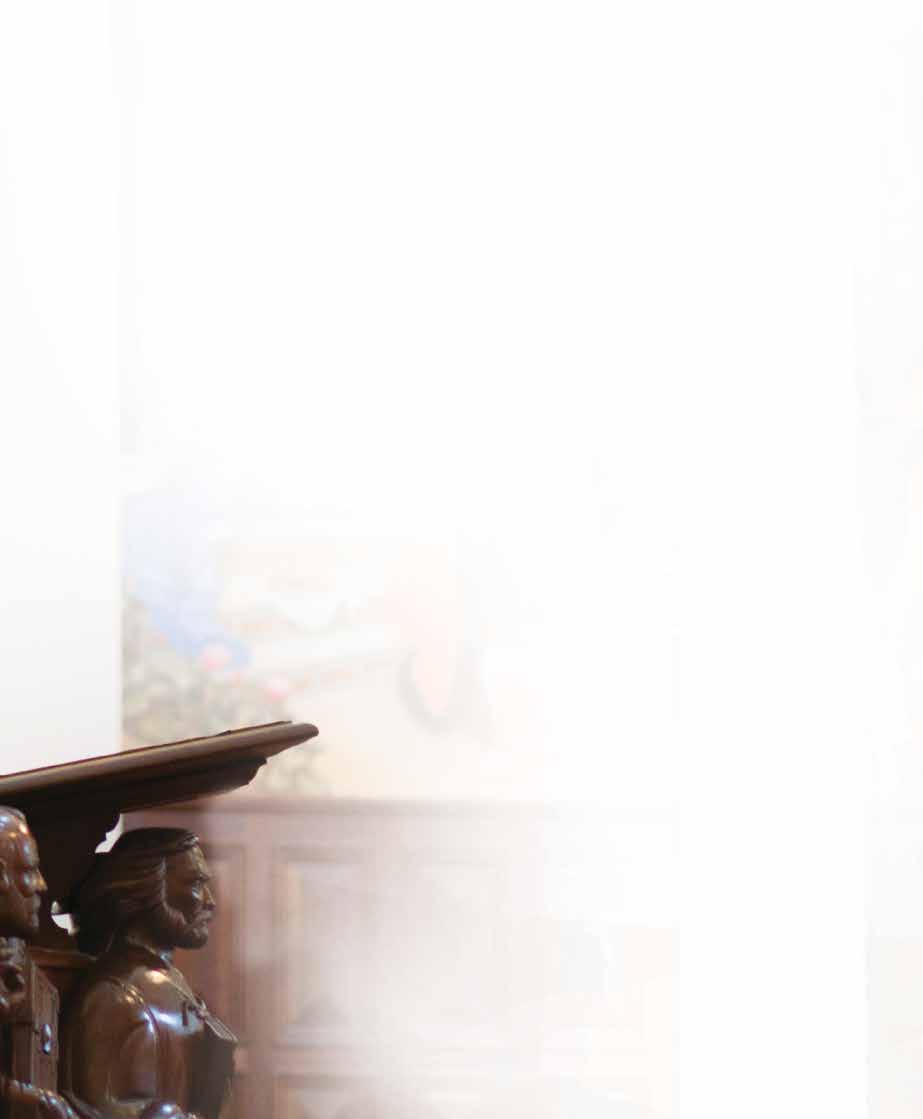
Pasquarello said he’s proud of Beeson’s history and doctrine sequence, setting the school apart from other seminaries and divinity schools. There is an effort to treat history not just as a past event, but as something to learn from and to connect to pastoral ministry. “I’ve always seen myself as a pastor with a PhD,” Pasquarello said. “The work I do is to serve the church.”
Pasquarello felt the call to ministry following five years in the United States Marine Corps, where he served as an officer until 1976. After initially believing he’d be a career officer, he had a “significant spiritual transformation,” and realized the skills he was using in the Marine Corps were congruent with church leadership.
This led him to Duke Divinity School, where he earned his MDiv. After graduating, he was ordained in the United Methodist Church, serving in pastoral ministry for 18 years in North Carolina with congregations in urban, suburban and small-town settings that were diverse in size, missional vision and commitment.
Pasquarello went back to school to earn his PhD in church history from The University of North Carolina at Chapel Hill, focusing on preaching and the retrieval and

recovery of preaching tradition.
Years before Beeson established a PhD program to train pastor-theologians, Pasquarello found himself drawn to the field, wanting to know more about how pastor-theologians integrated different disciplines in service to the church.
His first teaching job was at Asbury Theological Seminary, where he taught from 2001 to 2015 as the Anna A. and Granger E. Fisher Professor of Preaching, followed by three years at Fuller Theological Seminary (2015-2018) as the Lloyd J. Ogilvie Professor of Preaching, prior to his arrival at Beeson.
In 2018, the school’s founding dean, Timothy George, invited Pasquarello to deliver the annual Conger Preaching Lectures. The invitation followed the publication of Pasquarello’s book, Dietrich Bonhoeffer and the Theology of a Preaching Life.
About four weeks after Pasquarello delivered the lectures, then-associate dean Grant Taylor reached out to ask Pasquarello if he’d be interested in interviewing for a faculty position. One thing led to another, and Pasquarello joined the faculty ahead of the 2018-19 academic year, agreeing not only to teach, but to establish the Robert Smith Jr. Preaching Institute.
The work of the institute has enabled preachers in the community to begin peer groups, attend conferences and on-campus events, and take advantage of resources and retreats offered by Beeson. The institute now serves as the home of Samford’s Spirit and Power Project, which offers robust learning and mentoring opportunities for both aspiring and established preachers.
“The events we have done through the Robert Smith Jr. Preaching Institute have tried to bring together and integrate how learning, formation and practice are necessary to be a faithful minister of the Word,” Pasquarello said. “You continue to be a lifelong learner.”
For Pasquarello, Beeson’s small size and in-person format makes it a special place in the field of theological education. “There’s time to get to know students and be accessible,” he said. “The delight in teaching Beeson students is they are very passionate about reading and interpreting Scripture, and they know how to think theologically, especially the way I teach preaching out of the (Christian) tradition.”
Pasquarello and his wife, Patti, will be moving to Lexington, Kentucky, where he lived when he taught at Asbury. Their new home will be near three of their four adult children and their families, along with many friends. Pasquarello said he’s looking forward to joining Robert Smith Jr., who also retired at the end of this academic year, in Cincinnati to watch Reds baseball games.
“I am filled with gratitude for all I have been enabled to do by the grace of God,” Pasquarello said. D
samford.edu/beeson-divinity • 17
Pasquarello with his wife, Patti
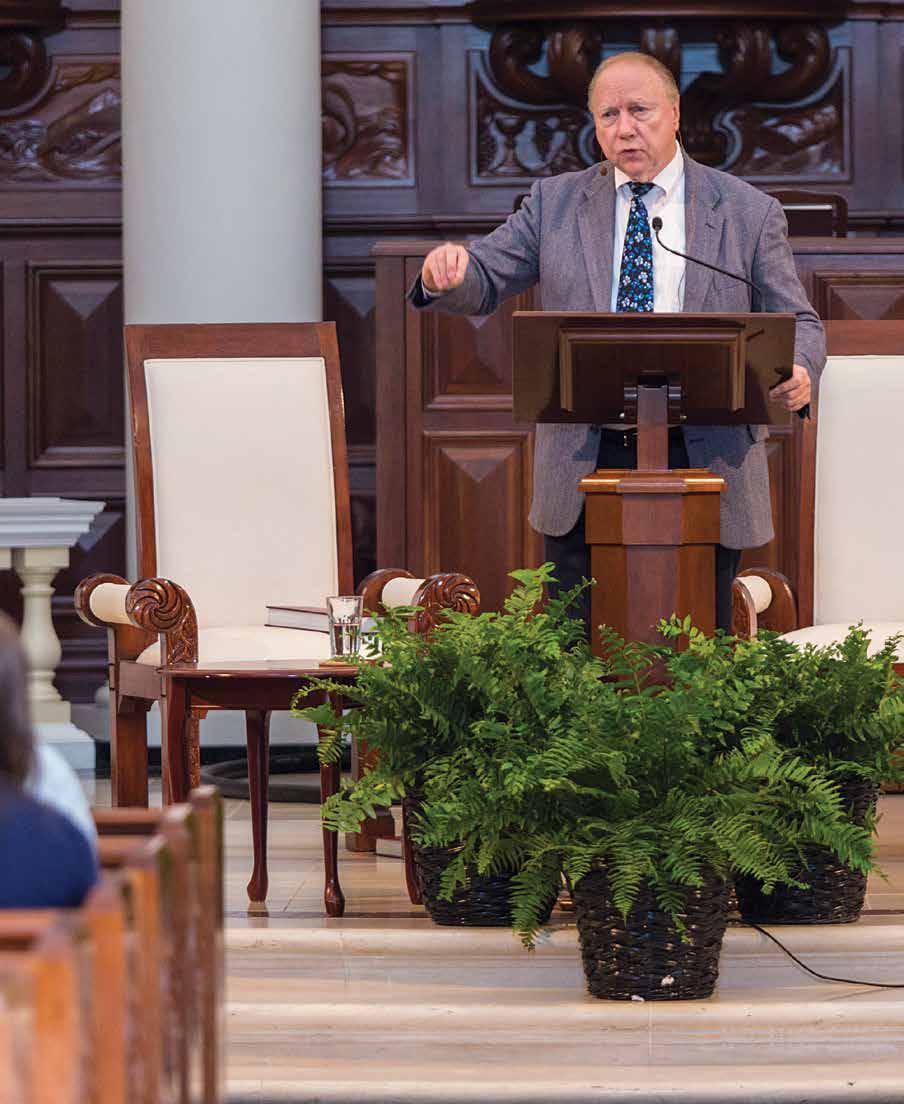
Interpret, Apply, Preach and Teach
After more than 20 years of teaching and serving Beeson Divinity School students, Allen Ross retired at the end of 2023.
"Allen Ross’s impact on this school has been immense. So has his legacy in the larger Christian world,” said dean Douglas A. Sweeney. “He is an outstanding scholar who has taught thousands of people how to interpret, apply, preach and teach the Word of God. We are grateful to the Lord for the time we’ve had with him."
Ross is renowned for his expertise in biblical exegesis and the Old Testament and praised Beeson for the school’s emphasis on the biblical languages and exegesis. Beeson’s smaller and interdenominational student body helped students have a better understanding of what others believe, Ross said, and helped him feel at home, given his experience in six different denominations.
“I think the close fellowship with several faculty members was a blessing,” Ross said. “Over the years, I have had some wonderful students. Beeson will be remembered fondly because of the spirit, the effort and the work of so many of them.” D
18 • Beeson Magazine • 2024
FACULTY BOOKSHELF 2024


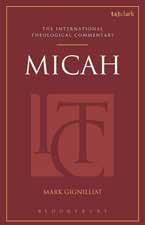
Going Deeper with Biblical Hebrew: An Intermediate Study of the Grammar and Syntax of the Old Testament
Chip Hardy (B&H Academic, February 2024)

Agur’s Wisdom and the Coherence of Proverbs 30
Alexander Kirk (SBL Press, May 2024)
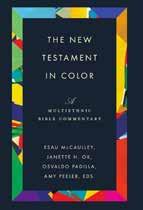
More than a Sermon: The Purpose and Practice of Christian Preaching
Douglas Webster (Lexham Press, May 2024)
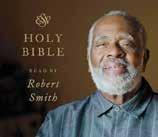
ESV Audio Bible, Read by Robert Smith
The New Testament in Color: A Multiethnic Bible Commentary
Osvaldo Padilla, Associate editor (InterVarsity Press, August 2024)
Robert Smith Jr. (Crossway Books, March 2024)
Micah: An International Theological Commentary
Mark Gignilliat
(T&T Clark, November 2024)
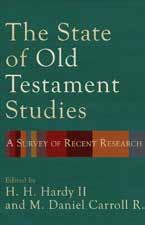
The State of Old Testament Studies: A Survey of Recent Research
Chip Hardy, Co-editor (Baker Academic, November 2024)
Athens and Jerusalem, Philosophy, Theology and the Mind of Christ
Gerald Bray (Lexham Press, forthcoming) No photo available
samford.edu/beeson-divinity • 19
AUDIOBOOK
Beeson Announces Addition of Two Old Testament Professors
In April, Beeson Divinity School announced the hiring of two new faculty members: Chip Hardy and Alex Kirk, who will both teach Old Testament and Hebrew.
Chip Hardy , who joins the faculty as an associate professor of divinity, comes from Southeastern Baptist Theological Seminary, where he has taught since 2014. He served as associate professor of Old Testament and semitic languages, and previously taught at Louisiana Christian University and in an adjunct role at Simmons College of Kentucky. In his time at Southeastern, Hardy’s academic work focused on the cultural and historical background of the peoples of the ancient Near East, specifically the biblical languages and the religious literature related to biblical texts.
“It is a distinct joy and honor to join this world-class faculty,” Hardy said. “Beeson Divinity School is a special place that the Lord is using mightily to prepare ministers to serve the church in Birmingham, across North America, and around the globe. My family and I are eager to be a part of that mission starting this summer.”
In addition to his teaching duties, Hardy served as senior research fellow for Southeastern’s Caskey Center for Biblical Text and Translation, as well as a senior research fellow for the Kirby Laing Centre for Public Theology, based in Cambridge, UK. Hardy has authored several books, articles and essays, including the forthcoming book, The State of Old Testament Studies: A Survey of Recent Research , which he co-authored with M. Daniel Carroll R. Hardy holds a PhD in Northwest Semitic philology from The University of Chicago.
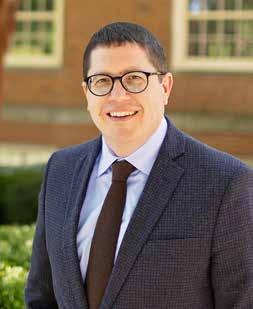
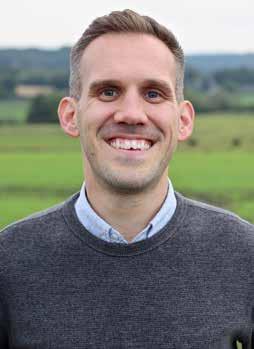
Alex Kirk , who joins as an assistant professor of divinity, most recently served as the lead faculty member for biblical studies and as tutor at Crosslands Seminary, an innovative, non-residential training course for ministry leaders in the UK.
Kirk earned his PhD in 2022 from Durham University. His first book, Agur’s Wisdom and the Coherence of Proverbs 30 , came from his dissertation research and will be available this summer.
For several years, Kirk has taught internationally, serving in South Asia, Liberia, Togo, Haiti, Serbia and Uganda, as well as in the United States at William Tennent School of Theology in Colorado.
“I could not be more excited about coming to Beeson Divinity School because I have long admired its reputation for academic excellence, its distinctive commitment to being a residential, in-person seminary, and its interdenominational, historic Protestant ethos,” Kirk said. “There is literally nowhere I would rather teach and serve.”
Douglas A. Sweeney, dean of Beeson Divinity School, said there were many outstanding applicants for the two positions, and the Lord “guided us clearly” in hiring Hardy and Kirk.
“Both Hardy and Kirk bring a passion for excellent biblical exegesis, discipleship ministry and care for God’s people,” Sweeney said. “We are delighted to welcome these expert Old Testament scholars to our outstanding faculty. They both love the Lord and the ministry of the Word. They both love our mission to form ministers for the church by means of rigorous, classical theological education carried out in a tight-knit, lifetogether setting.” D
20 • Beeson Magazine • 2024
FACULTY
Chip Hardy
Alex Kirk
THE BEST STORY TO TELL
Recapping the Conger Biblical Preaching Lectures
Christians have “the best story to tell,” said Jeremy Treat, pastor for preaching and vision at Reality Church of Los Angeles, during the Conger Biblical Preaching Lectures in February.
Treat shared, over the course of three lectures, that in a post-Christian world filled with false narratives and idols, Christians have the opportunity to show those who are lost the hope of Jesus Christ and how He satisfies our every longing.
Recalling his experience living and ministering in Los Angeles, Treat said it dawned on him one day that “God’s Word is the same, but I am in a completely different context,” he said. “We are no longer in Jerusalem. We are in Babylon.”
Our post-Christian society is marked by a distrust of authority, new digital technologies, a diversity of culture and divisive politics. In this new context, Christians must think carefully about what preaching is and how to do it well.
“I don’t think we need to reinvent preaching, but I do believe that we need to revive preaching and retrieve it from watered-down, entertainment-driven, don’t offend at all costs, consumeristic forms of preaching,” Treat said. “We need preaching that is grounded in Scripture, aimed at discipleship, socially aware, sensitive to wounds and centered on the good news of Jesus Christ.”
Treat reminded those gathered the power of preaching is in God, not the preacher. Biblically, God has always accomplished His purposes in the world through His Word,
“Preaching Christ means the goal of preaching isn’t for people to leave saying, ‘Wow, what a sermon,’ but, ‘Wow, what a Savior. ’ ”
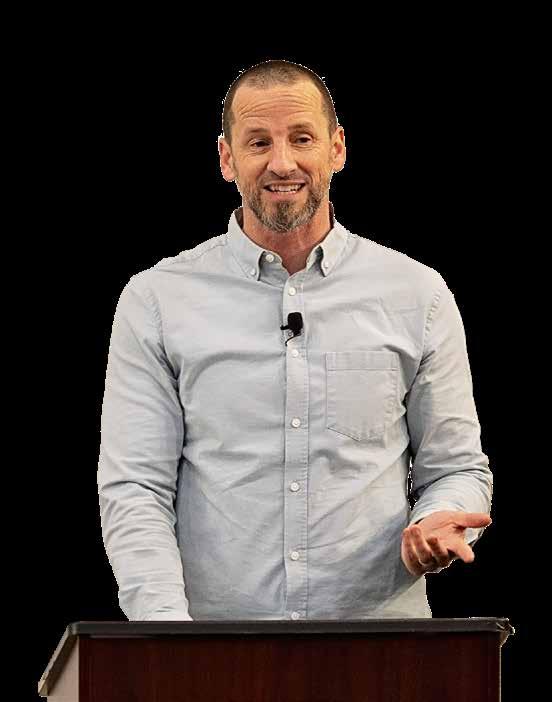
and the preaching of God’s Word has been the God-ordained means of revealing Himself as the Holy Trinity and meeting with His people. Quoting D.A. Carson, Treat said preaching is the “re-revelation of God.” And for pastors, preaching is a means of shepherding the church.
Preachers must be aware of culture and how those outside the church understand Scripture and how different cultural backgrounds can impact understanding. To preach Christ to the heart in a post-Christian culture, the aim is to exalt Christ, not self.
“Preaching Christ means the goal of preaching isn’t for people to leave saying, ‘Wow, what a sermon,’ but, ‘Wow, what a Savior,’” Treat said.
Those who preach must learn to get to Christ exegetically from anywhere in Scripture, understanding the Bible is Christ-centered, and to preach not just doctrines, but Christ Himself. Preaching to the heart, Treat said, means focusing not on behavior modification or transfer of information, but on bringing the sinner to the Savior. D
Scan the QR code to watch the Beeson Divinity Podcast episode with Treat.
Treat delivered the 2024 Conger Biblical Preaching Lectures at Beeson Divinity School.
samford.edu/beeson-divinity • 21
Celebrating Grace
Eastman points students toward Christ in Biblical Studies Lectures
Susan Eastman , associate research professor emerita of New Testament at Duke Divinity School, led students and guests through the book of Romans during the Biblical Studies Lectures in March.
Eastman emphasized the grace of God through the work of Jesus Christ, focusing on God’s steadfast love for His people and how Christ comes as the second Adam, representing mankind before God.
“Every one of us is a ‘leaky bucket,’ full of holes of doubt and sin and questions. Yet, God does not let go. Those very same holes are the way God’s love gets into our hearts.”
Reflecting on the first eight chapters of Romans, Eastman showed how the identity and work of Christ in the likeness of sinful flesh sums up the relational dynamic between God and man. Christ came and showed solidarity with those ensnared by sin and exchanged His place with them, that they might be saved.
While many people may hesitate at the idea of God handing humanity over to their sin (Romans 1:28), Christ Himself is handed over for our sake, Eastman said. “The Son shows solidarity with those in bondage and exchanges places (with them),” Eastman said. “To be in Christ is to benefit from His participation in our bondage.”
Eastman also walked through Romans 9-11, dealing with God’s promises to Israel. While it can be tempting to treat those chapters as a separate unit from the letter’s first eight chapters, this is a mistake. Christ shows enduring solidarity with Israel, coming into its history at the right time to bring salvation. “The place of sin’s dominion was the place of sin’s destruction,” Eastman said.
In Romans 9, where Paul expresses his desire to exchange places with his fellow Jews, Eastman said it
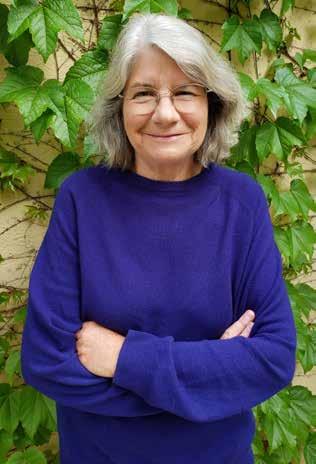
is as if the Gospel has so imprinted on his mind that the idea of solidarity and exchange comes naturally from him. Paul sees in his own salvation as a Jewish man an assurance that God has not forgotten His people and will save them through Christ.
Eastman described Paul’s words in Romans 9-11 as a warning to the Gentiles against arrogance. As Christ exchanged places with the sinner, so too have the Jewish people now traded places with the Gentiles, who have seen God’s mercy through Christ. And there is coming a day when, through seeing Christ’s salvation of the Gentiles, Jewish people will be saved. “It’s a trading of places,” she said. “The salvation of each hangs on the salvation of the other. They take turns in the place of disobedience in order to both be saved.” D
22 • Beeson Magazine • 2024
Scan the QR code to watch the Beeson Divinity Podcast episode with Eastman.
Global Center Hosts Timothy Tennent for World Christianity Focus Week
By Dakota Rice
Timothy Tennent, president of Asbury Theological Seminary and professor of world Christianity, spoke at the Global Center’s World Christianity Focus Week in April. Each year, the Global Center hosts World Christianity Focus Week, which emphasizes Christian efforts around the world.
Tennent preached in Beeson’s weekly chapel on Matthew 28:18-20 with his sermon titled, “Seizing the Momentum of the Great Commission.” While those who grew up in the church are used to hearing this text as a charge to make disciples, Tennent preached from a perspective of global redemption.
“It’s Matthew who talks about the flight to Egypt, which is such a remarkable story, not only theologically because Jesus recreates the exodus by coming out of Egypt (Hosea 11:1), but from a point of view of the globe and world Christianity, it is a wonderful redemptive story for Egypt,” Tennent said. “Because Egypt, who of course was known for being the oppressors of God’s people, now receives grace and becomes the protector of the Messiah. It’s a great picture of the redemption and reconciliation of the nations.”
Tennent also gave a special lecture as part of Beeson's Global Voices series, which offers regular opportunities to hear from those involved in missions work. In his lecture titled, “Theology and the Global Church: The Rediscovery of Theological Translatability,” Tennent spoke about the cultural translatability of the Gospel message, starting in Scripture itself.
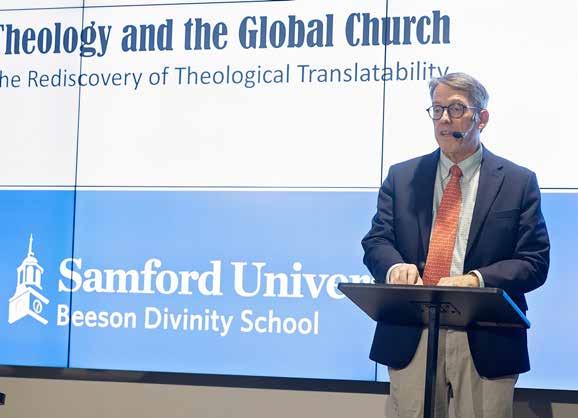
Using Acts 15 as his text, Tennent explained how this Scripture displays evident translatability of the Gospel message from the Jews to the Greeks. Moving to more modern times, Tennent explained the average Christian in the world has moved from being a 40-yearold white male to now a young female from Africa. Yet ultimately, the Gospel transcends gender, country, generation or color.
Dean Douglas Sweeney also interviewed Tennent on the Beeson Divinity Podcast. Tennent walked through his upbringing and what prompted his interest in
theological education and, eventually, concentrating his study in world Christianity. Their conversation could encourage those currently studying theology who may also have an interest in local or foreign missions as a vocation. D
Scan the QR code to watch the Beeson Divinity Podcast episode with Tennent.
samford.edu/beeson-divinity • 23 NEWS
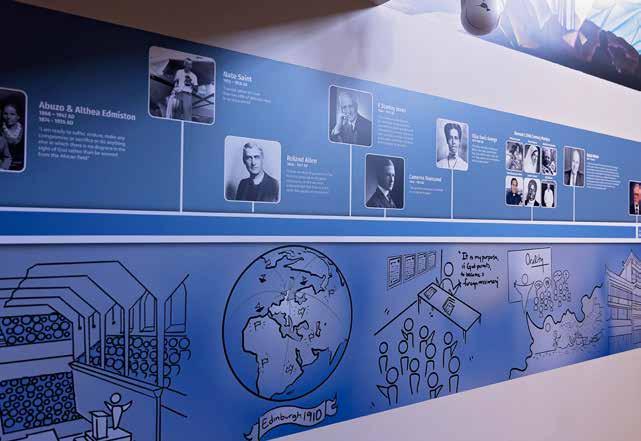
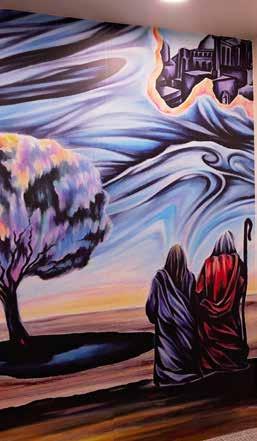

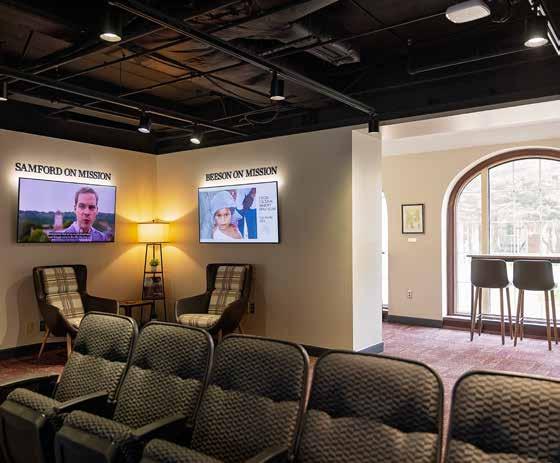

24 • Beeson Magazine • 2024
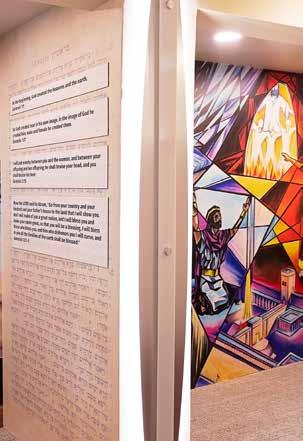


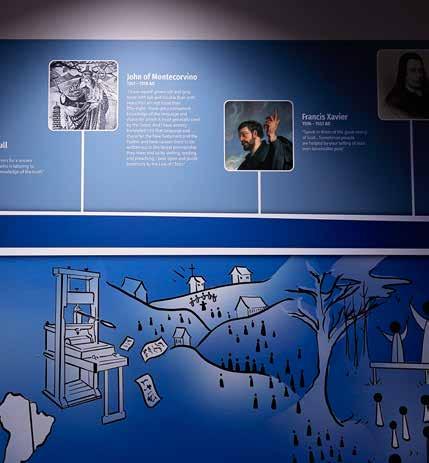
This year, the Global Center wrapped up exciting new renovations that allow visitors to step into the story of God’s saving work. Beginning in the hallway outside the center and continuing into the center, the new additions honor Martha Myers, a Samford graduate who was martyred while serving as a missionary in Yemen in 2002. From there, they tell a biblical narrative of God’s heart for the nations, displays a timeline of missions history and ends with a new creation mural based on Revelation 21 and 22.
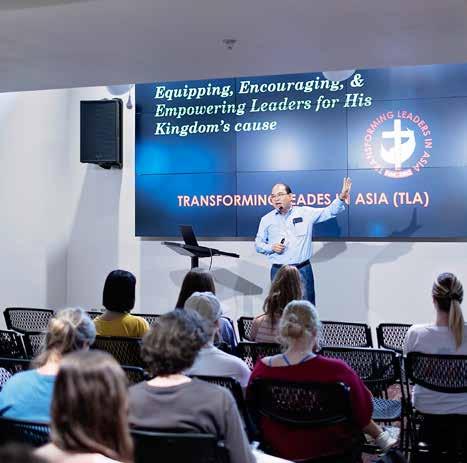
Beeson Holds Preaching Conference
Beeson Divinity School held a preaching conference in April, bringing in guest speakers and panelists and paying tribute to the preaching and teaching ministries of professor Robert Smith Jr.
In the opening worship session, pastor Fred Campbell of Mt. Zion Baptist Church in California preached from the opening verses of John about the role of the messenger as it relates to Jesus Christ. While John the Baptist and Jesus have similarities, the former was always intended to point to the latter. “The preacher is called not to be the content, but to be the voice,” Campbell said. “The wilderness needs a voice, and the voice needs the wilderness.”
The role of preaching is to introduce Jesus, Campbell said. “We do not have a message. We just preach one,” he said.
Duduit walked through ten steps Smith used to move from text to sermon:
1. Select a text with an eye toward congregational needs.
2. Read the text and record evocative questions.
3. Outline the structure of the text.
4. Interpret the text in its historical setting.
5. Formulate the theme and goal of the text.
6. Understand the text in its canonicity and redemptive history.
7. Formulate the theme and goal of the sermon.
8. Select a suitable sermonic form.
9. Outline the structure of the sermon.
10. Write the sermon.
Smith’s legacy in preaching will echo through eternity, Duduit said. “It will only be in that eternity that we will fully understand the lives you have touched, and the souls that have been changed as the Holy Spirit took your faithful preaching of God’s Word and used it for His glory, and that is all a preacher can hope for,” he said.
In the first of two panel discussions, Beeson alumni and friends of Smith spoke about Smith as a preacher. “You can put him in any context and he’s going to give God his best,” said Harry White, pastor of Watts Chapel Missionary Baptist Church in North Carolina.
David Eldridge, senior pastor of Dawson Memorial Baptist Church in Birmingham, Alabama, said Smith has played a Barnabas role in his life, encouraging and mentoring
preaching should endure,
panel, Smith’s role as a
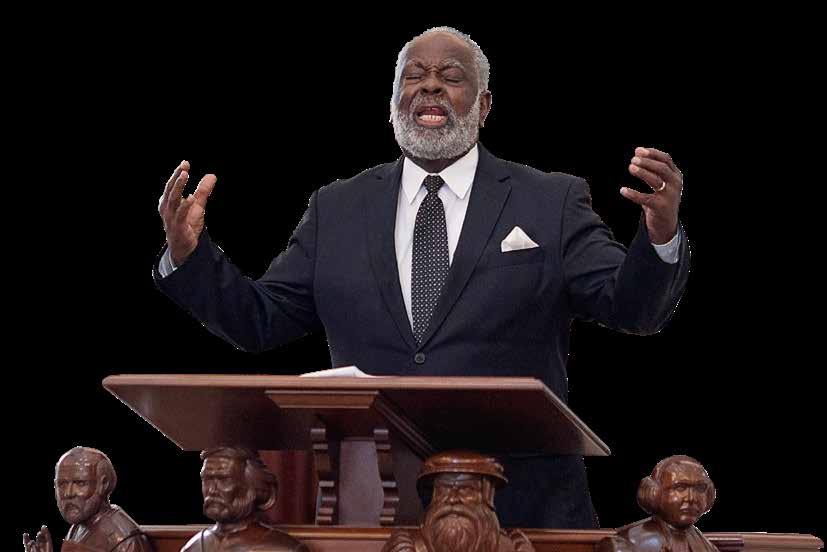
26 • Beeson Magazine • 2024
Conference to Honor Robert Smith Jr.
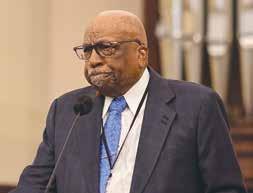
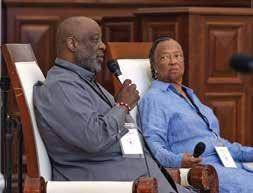

He has an uncanny ability to see your giftedness, and he will push you and pull you further than you think you can go.”
Reginald Calvert, pastor of New Jerusalem Missionary Baptist Church in Bessemer, Alabama, said Smith taught him to be ready to preach, and praised his impact on his life and ministry.
"I can't thank you enough, not only for pouring into my life, but for pouring into my church," Calvert said. "Your work goes far beyond the classroom, into our personal lives. We can't count the number of people that are being blessed through us, simply because of you."
In his sermon, which closed out the conference, Smith preached from the first chapter of Colossians, exalting the person and work of Christ, and the necessity of keeping our eyes on Him. “I want to contend that the Christ who is above all sends the Spirit of God to dwell in us all, to turn us away from error and to point us to God that we might authentically worship Him in time and in eternity,” Smith said.
Like the church of Colossae, Christians live in an age where their belief system is being attacked, Smith said, and what they believe will be shown in trying times. “You don’t know what you believe until it’s time to believe it,” Smith said. “When you have nothing left but faith, no gristle, no fat, no marrow, no title, no health, no family, no money, and all your props and crutches are
gone, your knowledge of God and that He is still good and is on the throne is the only thing that is going to keep you going.”
Christ is the one who defends Christians against an accuser, the one who imputes righteousness to His people, and the one who shows us what God is like, Smith said. No matter what they may face, believers have a Savior who is taking care of them, and who will bring them safely home.
"I know that the church has problems, and the church has foibles,” Smith said. “The church has wrinkles, and the church has its imperfections,
but I love the church. I’m going to stay with the church, because there is One who knows where to take her, and there is One who knows how to take her, and He’ll take your life and fix your heart and fix your family and fix your ministry.”
ROBERT SMITH JR.
At a banquet after the conference, Sheila Bailey, Joel Brooks and Jim Pounds paid tribute to Smith’s impact.
Bailey, whose husband was preacher E.K. Bailey, Smith's close friend, said in the last days of her husband’s life, he told his daughter, Cokiesha Bailey Robinson, that Smith would be her surrogate father. Robinson still calls Smith “Daddy Doc.” When she got married, Smith walked her down the aisle and Smith’s wife, Wanda, was sitting next to Bailey. She said Smith has taught her to pursue life, ministry and the Christian walk with excellence, and he has personified being a servant to others. “Thank you for not being on display, but being deployed,” Bailey said.
Joel Brooks, MDiv ’99, said Smith helped him as he struggled with dyslexia during his time in seminary. On one test, Brooks, struggling with the questions, crossed them out and wrote and answered his own. Smith gave him an A, along with a note, “Don’t ever do that again.”
“A zero would have squashed the spark,” Brooks said.
Smith once told him preaching should lead to celebration and encouraged Brooks to preach with more joy. “I have been preaching for 25 years,” Brooks said. “I have never had more joy in preaching the Lord’s Word, and that is largely due to you, Dr. Smith.”
samford.edu/beeson-divinity • 27
Fred Campbell
Harry White and Mary Moss
Sheila Bailey
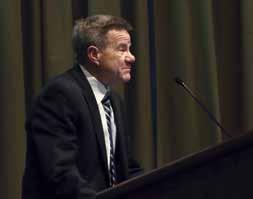
Jim Pounds, Beeson’s director of operations, talked about helping Smith and what an honor it is because of how much Smith has helped him. “We go and do what we can, because of what you’ve done for us,” Pounds said. “You pour into us love. You pour into us encouragement. You pour into us the belief that we can do what God has called us to do.”
Speaking at the end of the banquet, Smith said he was overwhelmed. “I don’t deserve this. It’s a gift of grace,” Smith said.
Smith thanked his wife, Wanda, for believing in him and encouraging him throughout his ministry.
“She believed in me when I didn’t see it. Thank you for believing in me and pushing me beyond appearances,” he said.
Smith closed by saying he will continue to serve the school he believes is “God’s best,” however he is needed. “To God be the glory. Great things He has done,” Smith said.
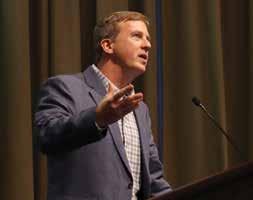
Spirit and Power Project
Douglas Sweeney, dean of Beeson Divinity School, announced at the banquet the Robert Smith Jr. Scholarship is now fully funded, and the interest from the endowed fund will be used every year to pay the tuition of a future minister of the Gospel. Sweeney thanked Beeson’s advancement officer, Gary Fenton, and the steering committee for their work.
Associate dean Tom Fuller also announced the inaugural class of fellows for the Spirit and Power Project. The program will offer a variety of new resources for current and aspiring preachers.
While a few more fellows will be announced at a later date, six men and women have agreed to serve in the role, mentoring and guiding preachers in their work:
• Jay Thomas , lead pastor, Chapel Hill Bible Church, Chapel Hill, North Carolina
• Maurice Watson , senior pastor, The Second Baptist Church, Little Rock, Arkansas
• Harry White , senior pastor, Watts Missionary Baptist Church, Raleigh, North Carolina
• Adam Dooley , pastor, Englewood Baptist Church, Jackson, Tennessee
• David Eldridge , senior pastor, Dawson Memorial Baptist Church, Birmingham, Alabama
• Carolyn Moore , senior pastor, Mosaic Church, Evans, Georgia
With the conference over, work has begun to further the mission of the Spirit and Power Project. The program will bring together its first preaching development cohort this summer, a group of 10 to 12 preachers who will meet four days a year for guided study, reading and developing their preaching skills alongside one another, led by Beeson faculty.
Peer-led groups will also be offered, similar to Beeson’s Thrive groups. Groups of pastors will commit to meeting together, reading together and building each other up, said program director Brady Graves.
In the fall, there will be student-led worship services, which will incorporate both Beeson students and Samford undergraduate students. The program will also offer funding for two- to fourday retreats for prayer and reflection for pastors. D
Scan the QR code for more information on the Spirit and Power Project.

28 • Beeson Magazine • 2024
Jim Pounds
Joel Brooks
A Place of Flourishing and Ministry
For Josh Hedrick, MDiv ’24, Beeson has been a place of flourishing—for not only himself but his whole family, including his wife Effie and 6-year-old daughter Eliyanah.
Hedrick grew up in a Christian home in Virginia and knew from an early age he was called to be a pastor, following in the footsteps of his grandfather. In 1998, at the age of 6, he met Effie at a campground when their families happened to camp beside one another. Years later, the Lord in His providence brought them together. “Effie’s role, both in my growth in the Lord and in sensing that draw to Beeson, was tremendous,” Hedrick said.
After getting married in 2016, Hedrick learned about Beeson through a church connection in Virginia and began searching for more information online. While he loved everything he saw about the school, the thought of uprooting his family from their home in Virginia was overwhelming. Despite his hesitation, they visited Beeson for a preview day, and were instantly struck by the way in which they were welcomed. “We immediately felt that we weren’t just numbers, not just an applicant on a page, but that we were people that these folks were really interested in knowing and getting to know,” Hedrick said.
Encouraged by the chapel message on that day, Hedrick realized how much Beeson treasured and prioritized God’s Word. As the day went on, it became obvious what the next step was for his family. “We’re walking down the stairs outside of Beeson’s chapel and were looking at each other. Effie said, ‘Josh, if you go anywhere for seminary, this is where you’ve got to go,’” he said.
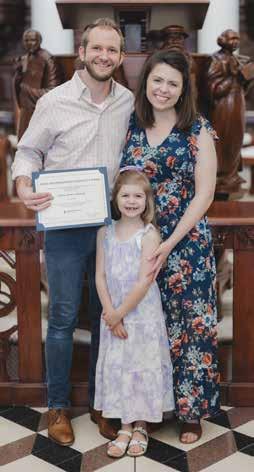
Hedrick went back home to Virginia and spent the next few months wrapping things up with his job at a church near his home and applied to Beeson in November. By fall 2021, the family had relocated so he could pursue his Master of Divinity.
After Hedrick’s first year at Beeson, Effie planned a surprise birthday party for him over the summer. The family went to a park in Homewood where Hedrick thought he was just spending time with his girls. As he played with Eliyanah, suddenly, he heard a loud noise as people ran across the lawn behind him and started shouting, “Happy Birthday, Josh!”
“I had never experienced anything quite like that, and it was telling of the kinds of relationships we were starting to form in this place,” Hedrick said.
In his second year, as Effie went
through some health struggles, the Beeson community wrapped its arms around Hedrick and his family. “We learned at that time what it is to suffer in community with other people,” Hedrick said. “I also experienced the gift of a few key friends who knew me well enough to be able to tell me during that season, ‘Josh, it’s okay for you to prioritize your wife right now instead of your school.’ It took people knowing me to tell me that.”
“I've been pursued by the Lord in this place in so many specific ways.”
JOSH HEDRICK
Hedrick said his time at Beeson allowed him to gain a real language for communicating the Gospel to others, and to go deeper into the truth that Jesus has been given for him and for others. “It’s been more than I thought it would be,” he said. “It’s been better. I’ve been pursued by the Lord in this place in so many specific ways. Through professors who have not only taught me but loved me, prayed for me and shepherded me. Through brothers and sisters who have walked alongside me on good and hard days and have showed me what walking in the way of the cross looks like. All have manifested the love of the Father and the outworking of the Gospel in everyday life.”
In his last year, Hedrick was named Beeson’s Most Distinguished Student, and he served as the school’s SGA president. He is now pursuing ordination in the North American Lutheran Church and hoping to secure a denominational internship in Birmingham for the next year. During that year, he hopes to meet the requirements for ordination as his family prays about where the Lord might take them next. D
samford.edu/beeson-divinity • 29
STUDENT AWARDS
Preach the Word! Massey Award Winner Charges Peers to Have Courage in Ministry
Jesse Carr encouraged his fellow students to remember the Gospel and to boldly proclaim God's truth in a post-Christian culture.
Carr, this semester’s recipient of the James Earl Massey Student Preaching Award, shared words of encouragement with his fellow students during the last chapel of the spring semester. The award is given each semester to a graduating student who exhibits excellence in the field of preaching.
Choosing to preach from 2 Timothy 1:3-14, Carr told his fellow students and members of the community to remember the promises of God and remain faithful to Him, wherever they find themselves. By possessing both genuine faith in Christ and the gifts He has given them, they need only look back to what they know is true as they face what lies ahead.
“Before we are servants, before we are pastors, before we are preachers, we are believers. We believe today the long promises of God unrolled throughout the
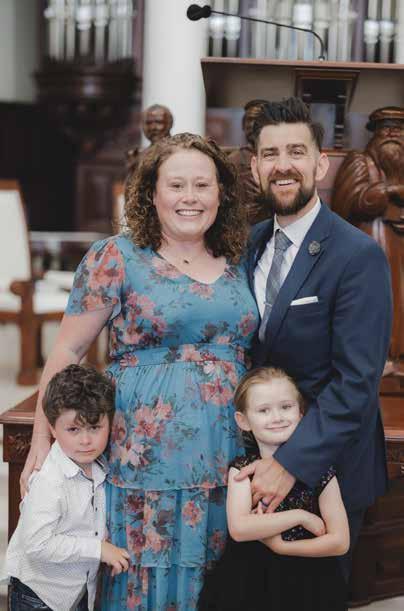
centuries, and that our God was faithful to His Word until it culminated at Calvary and three days later in the resurrection,” he said.
Carr encouraged his audience not to use Christian ministry as a place to “sew fig leaves” in order to cover up fear of people, which can lead ministers to water down God’s truth. The Gospel, he said, frees us even as we preach it to others, as it reminds us of where our value truly lies. “Our God has already spoken the final word about your value when He stretched out His arms for you at Cavalry,” he said. Carr tied pastoral ministry to the work of God that began in the opening pages of His Word. “Preach the Word. Take your place in the long line of those that have come before you and have proclaimed the Word of your God,” he said. “And stand with the Lord Jesus, knowing that faithful
ministry will never, never take you where it took Him. And you can preach knowing that our God’s last word about your past was spoken when He offered His Son to die in your place, and the last word about your future was spoken when He brought Him back from the dead three days later.”
Looking toward the future of God’s people, Carr reminded those listening the Gospel guarantees we will arrive safely at home. “If you are going to be safe at home, then you need to not stand in a pulpit with fear. You need to not approach your future with trepidation, but you can trust in God knowing that the last call about your life in Christ is safe.”
Carr currently serves as senior pastor at Sharon Heights Baptist Church in Brookside, Alabama, where he began serving in 2018. He’s been married to his wife, Amy, since 2007, and they have two
30 • Beeson Magazine • 2024
STUDENT AWARDS
“Before we are servants, before we are pastors, before we are preachers, we are believers.”
JESSE CARR
children: Priscilla, 6, and Asa, 4. “Amy is without a doubt my biggest fan, my best cheerleader, who has always believed in me and supported me,” Carr said.
Originally from North Carolina, Carr, the son of a preacher, felt called to preach at the age of 13 and began pastoring his first church at 22. He began seminary later in life than many of his fellow students, which has allowed him to both learn from them and also serve as a mentor to other aspiring pastors. During his time in seminary, Carr has seen the Lord’s faithfulness, as God has come through when he’s felt stretched too thin. “He’s the one carrying the weight,” Carr said.
One lesson Carr has learned in his time at Beeson is a lesson he said we all need to hear over and over. “He will not fail. He will not let His people down. He will always come through,” he said. D
Scan the QR code to watch
Additional Awards
In addition to the Massey Award, Beeson Divinity School awarded several other honors during the April 16 chapel service. Other students receiving honors were:
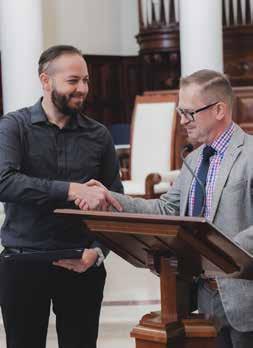
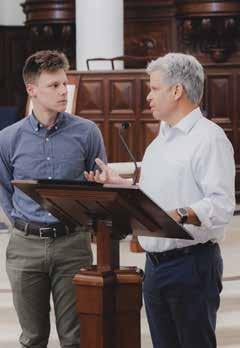
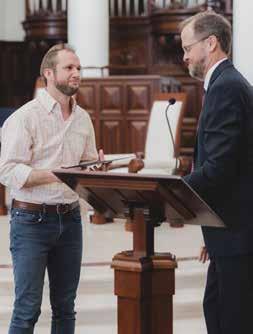
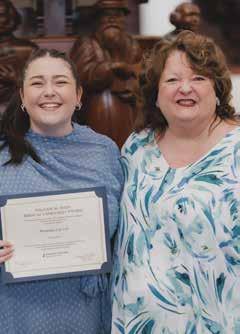
samford.edu/beeson-divinity • 31
STUDENT AWARDS
Carr with his wife, Amy, and their two children, Asa and Priscilla
History and Doctrine Award Manny Boston
Most Distinguished Student Award Josh Hedrick
William M. Todd Award for Biblical Languages Miranda Cox
Pastoral Ministry Award Hayden Betsill
Carr's full sermon from the final chapel service of the spring semester.
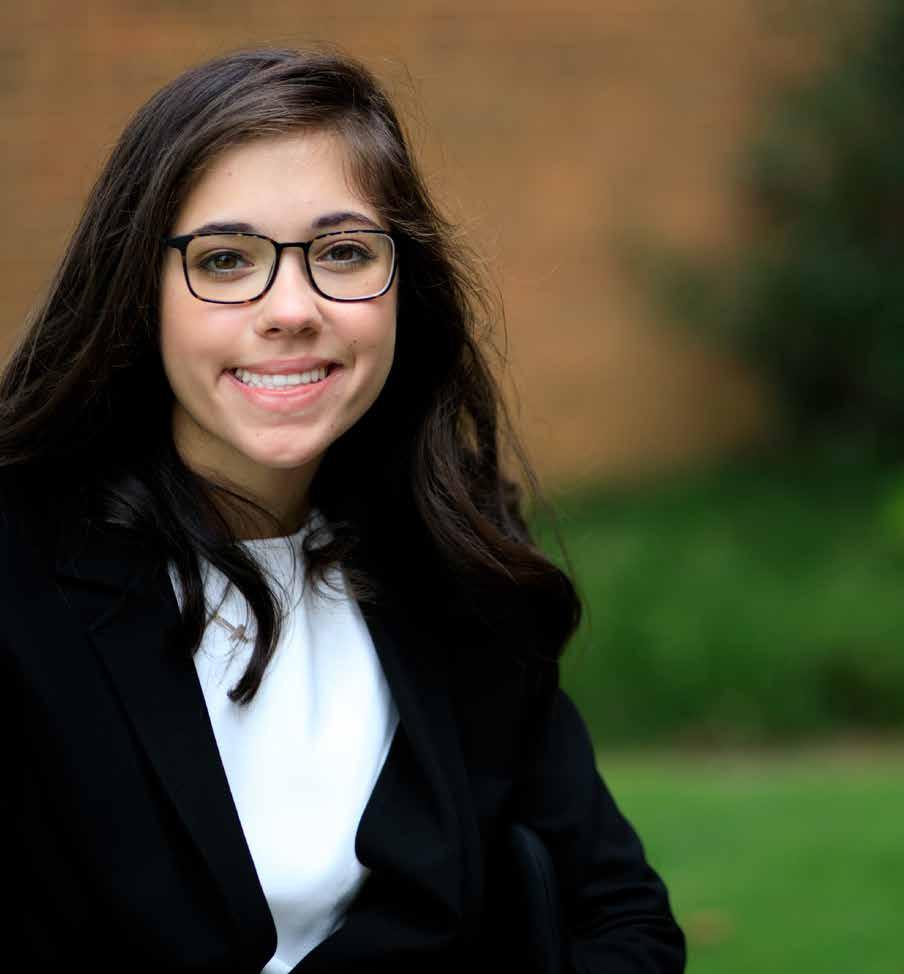
Beeson graduate
tells her story of God’s faithfulness
Morgan Champion thought she knew where she was heading when she first came to Samford in 2018. She was a part of the University Fellows program, a pre-law student and a double major in Spanish and journalism and mass communication. She did all of this while living with cerebral palsy, using a wheelchair and navigating being on her own for the first time.
Yet, a few months into her freshman year, Champion realized she wasn’t doing what the Lord had called her to do. She had a conversation with her parents and told them she felt called to ministry. Champion changed her major to religious studies, still believing law school would be in her future.
32 • Beeson Magazine • 2024
But God had other plans.
Through a relationship with Jim Barnette, a professor in the Department of Biblical and Religious Studies, Champion learned she had a platform because of her disability. Barnette, struck by her evident giftedness in preaching and teaching, encouraged her to pursue a graduate degree at Beeson. “He was the most amazing, incredible person,” she said. “I wouldn’t be where I am without Dr. Barnette.”
Before coming to Samford, Champion had never spent more than two weeks away from her family, who lives in Georgia. The first semester was a challenge, she said, as cerebral palsy forces the body to use about five times more energy to accomplish tasks. But over time, she became more confident, helped by the Samford community that became a home, a safe place and a respite. “Samford really gave me the confidence to say, ‘This is who I am. This is what I’m good at. This is what the Lord has called me to do,’” she said.
As she prepared for Beeson, Champion admitted she didn’t know what she was getting into. “It was something that could only happen by the Lord’s grace,” she said.
Professors at Samford advocated for her and encouraged her as she applied. Barnette planned to write a letter of recommendation, but he was diagnosed in 2020 with Creutzfeldt-Jakob disease, an untreatable degenerative brain disorder. Barnette died in February 2021. “It was really hard when he passed away,” Champion said. “I had to figure out who I am in ministry without him.”
Champion was the inaugural recipient of the James Barnette Award for Excellence in Preaching. She also completed her supervised ministry at Brookwood Baptist Church in Mountain Brook, Alabama, where Barnette served as senior pastor.
Transitioning into divinity school presented new challenges for Champion.
Cerebral palsy can cause vision issues and a lack of depth perception, which was a problem when it came time to learn Greek and Hebrew. Champion’s eyes struggled to read the Greek alphabet. “Randy Todd pulled me through that first semester of Greek, kicking and screaming,” Champion said. “I wouldn’t have made it through without Dr. Todd.”
“It's been really hard, but it's been a blessing to see how the Beeson community has come around me and poured into me in this season–when I didn't know how the Lord was going to provide even the basic things like transportation and meals.”
MORGAN CHAMPION
Champion credited professor Mark Gignilliat with helping her through Hebrew when the time came as well. Despite the challenges, Champion never considered changing her degree path to one which would not require learning the biblical languages, knowing she was called to earn a Master of Divinity. “I knew that’s what the Lord wanted me to do, even though it was really hard,” she said. “I knew I would not be faithful if I was not getting through that season. The blessing is I had so many people that first year come alongside me as I was learning the languages and helping me.”
As she conquered Greek and Hebrew, Champion also continued to grow more and more independent, even moving to an off-campus apartment. She also gained new relationships as she trusted the Lord to provide transportation to and from school each day.
“It’s been really hard, but it’s been a blessing to see how the Beeson community has come around me and poured into me in this season—when I didn’t know how the Lord was going to provide even basic things like transportation and meals,” she said. “Some of my favorite friendships at Beeson were built inside people’s cars, which is just crazy to me. It’s a living, breathing testament of God’s grace and God’s provision.”
Beeson also gave Champion the opportunity to study preaching under Robert Smith Jr. “I would follow Dr. Smith blindfolded anywhere,” Champion said. Her whole experience at Samford has confirmed her calling, and the Lord has used her time here to push her in ways she is grateful for. Champion graduated in April, after a combined six years at Samford, and she describes life after college like stepping into an unknown abyss. “I’m waiting for the Lord to open the right door,” she said. “The Lord has brought me this far. I believe He’ll do it now.”
Wherever she goes, Champion plans to be an advocate for those with disabilities inside the church. Not many people have the background and perspective she does, and she often thinks about how what she’s learned at Samford can be used to help those with disabilities better follow Christ and be active members of a church.
While living with cerebral palsy has presented challenge after challenge, Champion said she wouldn’t change it even if she could. “If the Lord came up to me and asked if I wanted to be healed today, I would say no,” she said. “My disability is a huge part of my ministry to people, and I truly believe that I will not be done with my ministry to these people until I am in heaven.” D
samford.edu/beeson-divinity • 33
New Scholarships Support Students’ Call to Ministry
Since its founding , Beeson Divinity School has remained committed to providing scholarship assistance to all of its fulltime master’s degree students. And through the generosity of many, over the last two years, the school has seen a notable increase in new scholarships, designated to support students as they pursue God’s calling on their lives.
Several recent scholarships have been created to specifically support the members and staff of individual churches in the Birmingham area, including Redeemer Community Church and Third Presbyterian Church.
“Establishing these endowed and annual scholarships is a gift that blesses not only the individual recipient, but our community as a whole,” said Gary Fenton, development officer for Beeson Divinity School. “We celebrate how these scholarships deepen our connections to these local churches, our neighbors.”
Similarly, the new South Highland
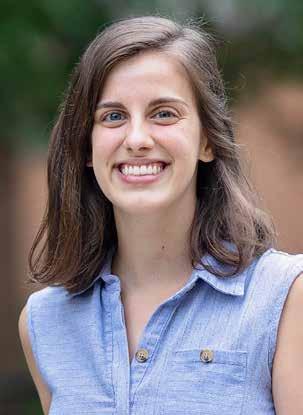
Presbyterian Church of Birmingham Endowed Scholarship gives first preference to recipients who are members of the Presbyterian Church USA, ECO Presbyterian or the Evangelical Presbyterian Church.
Scholarships have also been created by donors to honor the memory of their loved ones. Last year, Samford alumnus and longtime Birmingham-area pastor Jim Auchmuty ’57 established the Sue Meadows Auchmuty Endowed Scholarship in loving memory of his wife. The scholarship will be awarded to Beeson students who demonstrate financial need.
Additionally, the Leila Bryant Beaird and Mary Nell Beaird Medley Scholarship was established by a gift from the estate of Joe Nix Quin ’60, a McWhorter School of Pharmacy graduate, in honor of his mother and aunt. Quin wanted to use the resources God gave him to further the work of God’s kingdom.
“Beeson is a unique seminary in that
students are required to attend class in person,” Fenton said. “It is also unique in that it is interdenominational. As a result, the students do not have denominational support and are often required to move here to take classes.”
In light of this, the school celebrates that its Wesleyan Studies Scholarship has become fully endowed after several years of faithful giving. The scholarship was established by Methodist laypersons to assist students who are members of churches in the Wesleyan tradition and who are pursuing a certificate in Wesleyan studies at Beeson. And with its endowed status, the scholarship will be awarded in perpetuity. D
Scan the QR code to learn more about how you can support scholarships at Beeson.
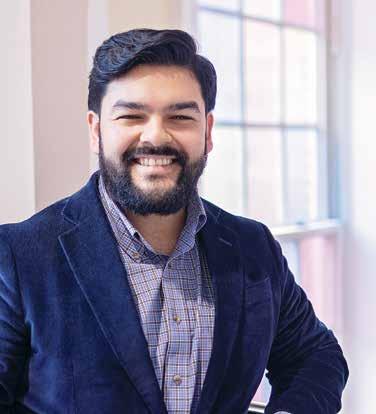

34 • Beeson Magazine • 2024
Cecelia Ann Walker Named Beeson’s Alumna of the Year
Cecelia Ann Walker, MDiv ‘98 , executive director of chaplaincy and clinical pastoral education for Brookwood Baptist Health, has been named Beeson Divinity School’s Alumna of the Year. She also serves as a member of Samford’s Board of Trustees.
Walker was working as a librarian in the early 1990s when she felt God calling her into ministry. “I didn’t know what I would do,” she said. “I went over to Beeson to find out what that would look like. I had two small children and was working fulltime. I knew I’d have to continue to work and wasn’t sure I would be accepted.”
But God displayed His faithfulness to Walker. After being accepted to Beeson, Walker went to her library director and asked if there was a way she could work nights and weekends in order to take classes during the day. Her director agreed without hesitation. “I could see that God’s hand was all over it,” she said.
In 1998, as she prepared to graduate, she still was not sure what exactly the Lord was calling her to do. Yet the Lord kept bringing two memories to the top of her mind. She recalled the time she lost her dad, who died at Cooper Green Hospital, as well as when she lost her husband, who died a few years later at St. Vincent’s Hospital.
As her husband was dying, a St. Vincent’s chaplain asked if she wanted to see him one more time. At first, she hesitated, reflecting on how her father’s
“All of the professors were so invested in us and showed the deep love for God and God’s people. That impacted me greatly.”
CECELIA ANN WALKER
death was a traumatic experience, but the chaplain assured her he would be with her the entire time. This gave her the strength to say goodbye.
Those memories spurred her on to pursue a career in chaplaincy.
Her first internship, she recalled, was extremely hard, filled with death and dying. Pressing on, Walker worked at what was then Baptist Health System and later at the University of Alabama at Birmingham (UAB) Hospital. She began a chaplaincy program at the Veterans Affairs hospital in Montgomery and Tuskegee before Baptist Health called her back to serve as the director of pastoral care for Princeton BMC and to lead the clinical pastoral program for the system. “God has His ways,” she said.
In 2019, Walker was promoted to oversee all chaplaincy efforts and clinical pastoral education for Brookwood Baptist Health in her role as executive director.
Her time at Beeson prepared her well for what the Lord would call her to do. “All of the professors were so invested

in us and showed the deep love for God and God’s people,” Walker said. “That impacted me greatly.”
It also allowed Walker to learn from smart and humble professors. “They gave their best so we could become our best,” she said. “It’s been the gift that keeps on giving.”
Walker’s service to others through her chaplaincy efforts has inspired fellow Beeson alumni. “She has touched so many people and is a constant example of living a life of Christ and so much more,” said Meechie Williams, MDiv ’14.
“She is a proven leader in her community. She has proven herself to be an effective leader in her field, training many chaplains who not only serve in facilities in Alabama but also around the country,” said Lawayne Custard, MDiv ’20.
Being named Alumna of the Year is special, Walker explained. “I’m humbled and honored.” D
samford.edu/beeson-divinity • 35 ALUMNI
1992
Clay Hallmark (MDiv ’92) recently published From Death to Life: The Heart of Church Revitalization. Clay serves as senior pastor of First Baptist Church of Lexington, Tennessee.
1997
Russ Levenson (DMin ’97) received an honorary Doctor of Divinity from Nashotah House Theological Seminary. Russ is the rector of St. Martin’s Episcopal Church in Houston, Texas.
1998
In July 2023, Ed Stetzer (DMin ’98) was appointed dean of Biola University’s Talbot School of Theology in La Mirada, California.
2001
Mark Gainey (MTS ’01) published the book, 4 Invitations: How the Four Disciple-Making Invitations of Jesus Can Help You Be a Disciple Who Makes Disciples in 2021 Mark is the lead pastor of Fultondale First Baptist Church in Fultondale, Alabama. He also serves on the Alabama Baptist State Board of Missions.
Lieutenant Colonel Matthew Madison (MDiv ’01) was recently selected to become the next 7th Infantry Division chaplain at Joint Base Lewis McChord near Tacoma, Washington. Before assuming his new duties, he was the garrison chaplain at Redstone Arsenal in Huntsville, Alabama.
2002
Latondra Heaven (MTS ’02) became copresident of Central Florida Christian Chamber of Commerce along with her husband Bristan. Latondra is also a co-founder and pastor of E3 Ministries, Inc., in Orlando, Florida.
In November 2023, Jay Watson (MDiv ’02) and Kyle Wiltshire (MDiv ’03) published a fiction book titled, The Dead Rock Stars: A Novel.
2005
Jake Andrews (MDiv ’05) recently became associate rector of Trinity Episcopal Church and priest-in-charge of St. Bartholomew's Episcopal Church in Florence, Alabama.
2008
Justin Nalls (MDiv ’08) was selected to become the next lead pastor of Ingleside Baptist Church in Macon, Georgia.
2010
In March 2024, Ryan Adams (MTS ’10) began serving as senior pastor of Philadelphia Baptist Church in Birmingham, Alabama.
Cole Huffman (DMin ’10) became senior pastor of The Gospel Church in Nashville, Tennessee, in May 2022.
2011
In September 2022, Alyse Fulton (MDiv ’11) became director of congregational care at Central United Methodist Church in Rogers, Arkansas.
2012
Timmy Ray (MATS ’12) became associational missions strategist for Colbert-Lauderdale Baptist Association in August 2023.
Lisa Taylor (MDiv ’12) recently became director of the Institute for Spiritual Health at CHRIS 180, an Atlanta-based nonprofit providing trauma-informed mental health services for children, youth and families.
2013
Nathan Daniels (MDiv ’13) became senior pastor of First Baptist Church Ashville in Ashville, Alabama, in September 2023.
In July 2023, Chase Porter (MDiv ’13) was appointed as department chair of history and government at California Baptist University in Riverside, California.
Hayden Walker (MDiv ’13) was ordained to Gospel ministry at Calvary Baptist Church in Little Rock, Arkansas, in 2023.
2014
Charles Cisco (MDiv ’14) completed a PhD in New Testament and Christian Origins from the University of Edinburgh in September 2023.
Daniel Hightower (MDiv ’14) became campus minister for Reformed University Fellowship (RUF) at Clemson University in January 2024.
2015
Stephen Payne (MDiv ’15) recently became an elder at Grace Covenant Baptist Church in Vestavia Hills, Alabama.
In May 2023, Jackie Pettus (MDiv ’15) became missions coordinator at Highlands College in Birmingham, Alabama.
2016
Lyle Lee (MDiv ’16) became president of Huntsville Bible College in Huntsville, Alabama, in January 2024.
2018
Auburn (Powell) Josephs (MDiv ’18) married Maxwell Josephs on July 1, 2023. Auburn is a PhD student at Wheaton College.
Cameron Thomas (MDiv ’18) recently became senior pastor of Hutchinson Missionary Baptist Church in Montgomery, Alabama. He also serves as assistant vice president and dean of chapel at Talladega College.
2019
Dylan Evans (MDiv ’19) recently became student pastor at Lakewood Baptist Church in Gainesville, Georgia.
2020
Deanna Smith (MDiv ’20) recently became director of pastoral care at UAB Medical West.
James Spencer (MDiv ’20) recently became student pastor at Harp’s Crossing Baptist Church in Fayetteville, Georgia.
2022
In August 2023, Teal Cuellar (MDiv ’22) began teaching at The Altamont School in Birmingham, Alabama.
2023
Zack Clemmons (MDiv ’23) was ordained to the Anglican Priesthood at Christ the King Anglican Church in Birmingham, Alabama, in September 2023.
In March 2024, Jermaine Johnson (MDiv ’23) became senior pastor at Green Liberty Baptist Church in Birmingham, Alabama.
In August 2023, Caleb Witt (MDiv ’23) began serving as the student pastor at First Baptist Church Kosciusko in Kosciusko, Mississippi.
36 • Beeson Magazine • 2024
ALUMNI UPDATES
Baby Updates
2013
In July 2023, Amy Hirsch (MDiv ’13) and her husband Matt welcomed their son Theodore. Amy serves as associate minister for membership and pastoral care at Mountain Brook Baptist Church in Birmingham, Alabama. 1
2017
In February 2024, Bradley Patton (MDiv ’17) and his wife Meredith welcomed their son Henry. Bradley serves as the care minister at Shades Mountain Baptist Church in Birmingham, Alabama. 2
2018
In November 2023, Wes Durrwachter (MDiv ’18) and his wife Whitney welcomed their son Ian. Wes teaches social studies at Bessemer Academy in Bessemer, Alabama. 3
Kadie (MDiv ’18) and Ethan (MDiv ’18) Smith welcomed their second child, Bea, in December 2023. Kadie and Ethan worship and serve at Grace Fellowship in Birmingham, Alabama. 4
2019
Daniel Gilliland (MDiv ’19) and his wife Maggie welcomed their daughter Emma in December 2023. The Gillilands are members of Iron City Church in Birmingham, Alabama. 5
Will Sorrell (MDiv ’19) and his wife Sarah Catherine welcomed their daughter Lucy in December 2023. The Sorells are members of Grace Fellowship in Birmingham, Alabama. 6
2020
Mark David Bradford (MDiv ’20) and his wife McKenna welcomed their second child Luke in December 2023. Mark David is the missions and disciplemaking pastor at The Station Church in Bessemer, Alabama. 7
Kara Fincher (MATS ’20) and her husband Caleb welcomed their daughter Grace in October 2023. The Finchers are members of Dawson Memorial Baptist Church in Birmingham, Alabama. 8
Cameron Patterson (MDiv ’20) and his wife Ann Mathews welcomed their son Chapman in October 2023. Cameron serves as a pastoral counselor at Unbound Grace Ministries in Birmingham, Alabama. The Pattersons are members of Faith Presbyterian Church. 9
2023
In September 2023, Matthew Hutchens (MDiv ’23) and his wife Allie welcomed their son Landon. Matthew is the pastoral assistant at New Hope PCA Church in Clemmons, North Carolina. 10
Jared Willett (MDiv ’23) and his wife Sarah welcomed their first child in January 2024. Jared serves as curate at All Saints Anglican Church in Springfield, Missouri. 11











samford.edu/beeson-divinity • 37 ALUMNI UPDATES
6 2 3 4 5 7 8 11 10 9 1 We want to hear from you! Follow us on social media. @BeesonDivinity samford.edu/beeson-divinity/alumni
800
In January, Beeson Divinity School welcomed its first cohort of students in its new PhD in Theology for the Church.
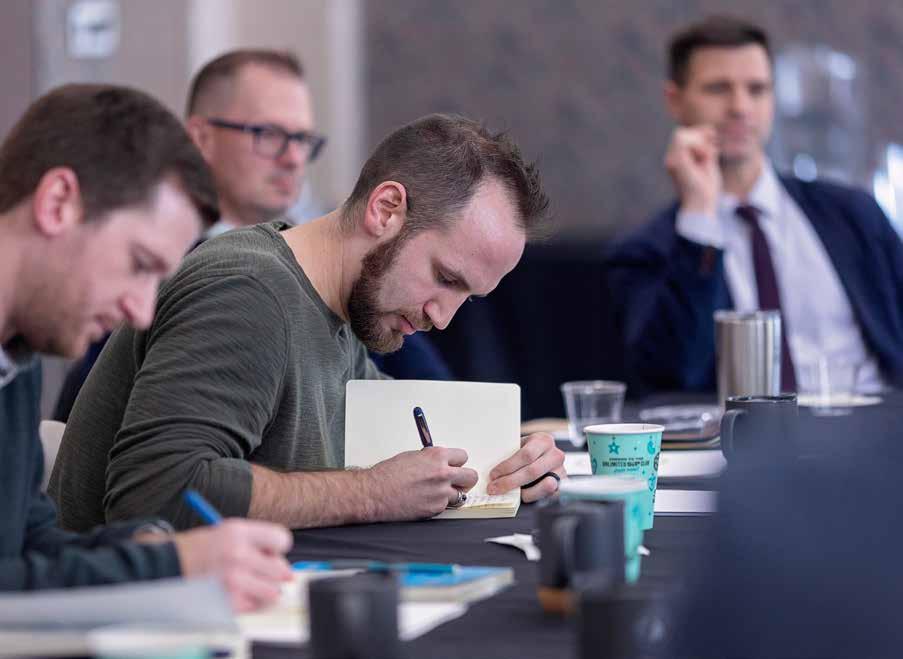
Lakeshore Drive Birmingham, AL 35229


















































































